

COP28 and the Superyacht Community: Navigating Decarbonisation
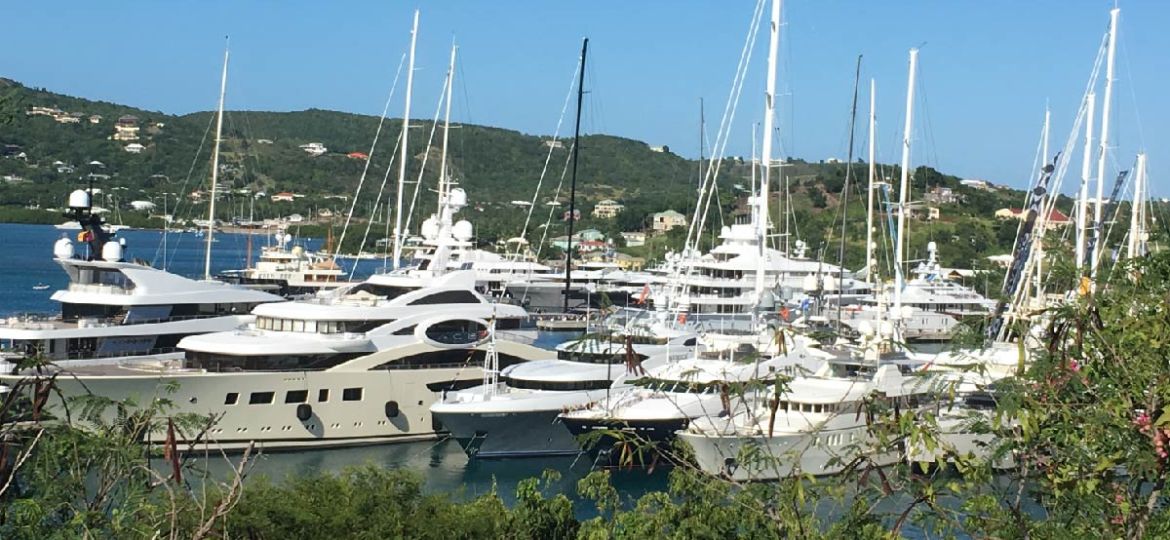
With the recent conclusion of COP28, we would like to highlight some key takeaways from the conference that we feel are particularly pertinent to the superyacht community. During the Closing Plenary, COP28 President Dr. Sultan Al Jaber emphasised the collective commitment to adhere to the Paris Agreement’s target of limiting global warming to 1.5°C and to step up climate action efforts. Noteworthy developments include a global commitment to triple renewables and double energy efficiency, and the fact that the summit’s final agreement, for the first time, established language on fossil fuels. For the superyacht community, this marks a critical time to further our shift away from fossil fuels. We invite you to delve into our insights below. As always, we are eager to hear your thoughts as well, so please don’t hesitate to get in touch.
Sustainable Marine Fuels
A particularly engaging topic that COP28 tackled was ‘Decarbonising Marine Shipping: Promoting the Transition to Sustainable Marine Fuels.’ This topic has far-reaching implications for the marine industry, particularly regarding fuel choices. It is encouraging to note that a number of superyachts are already embracing biofuels. Notably, advanced biofuels, derived from waste and non-food crops, are emerging as key elements in this change. We spotlighted the shift towards biofuels in our recent article on the topic. While there are concerns about their current limited availability, we remain hopeful about the future expansion of biofuel supplies, signalling a major leap forward in sustainability.
Small Island Developing States and Equitable Energy Transition
COP28 placed a spotlight on the equitable energy transition for Small Island Developing States (SIDS). The focus was on their path towards a climate-resilient future. The conference recognised the need for international support to help SIDS to scale up renewable energy and energy efficiency. It also addressed strategies for decarbonisation, financing, and regulatory frameworks. These topics resonate deeply with the superyacht community, which frequently visits SIDS. It underscores the importance of adopting responsible and sustainable energy practices in such sensitive ecosystems. At Yacht Carbon Offset, we are proud to support this initiative. Our carbon reduction projects are based exclusively in developing countries, aligning closely with the vision set out at COP28.
Decarbonising Industry with Technology
COP28 placed a significant emphasis on industrial decarbonisation, a topic we feel is of particular interest to shipyards. The summit kicked off with the ‘Climate Innovation Forum’ and continued to offer a wealth of discussions on how technology can aid in decarbonising industries. The ‘Decarbonising Industry with Technology Program’, a joint initiative by the Ministry of Industry and Advanced Technology (MoIAT) and the United Nations Industrial Development Organization (UNIDO), is exploring industrial decarbonisation, the green energy transition, and innovation in climate action. For the superyacht sector, a key player in sustainability, it’s crucial to stay abreast of these developments.
Non-CO 2 Greenhouse Gases
COP28 actively addressed methane and other non-CO 2 greenhouse gases (GHGs), which are significant contributors to global warming. The summit pushed for major economies to act decisively, aiming to cut global warming by up to 0.5°C by 2050. For the superyacht community, it will be interesting to see how COP28 may impact technologies like Selective Catalytic Reduction (SCR), which are effective in controlling non-CO 2 GHGs, thus playing a pivotal role in reducing overall GHG emissions. You can read more about GHGs, SCR, and why carbon offsetting is crucial here .
Other Key Highlights
- SMEs: COP28 highlighted the role of small and medium enterprises (SMEs) in the climate battle, with a focus on decarbonisation and value chain solutions. This is particularly relevant for SMEs in the maritime industry, given its critical role in global trade and the economy.
- Building Confidence: The summit underscored the importance of fostering belief in a sustainable future, a sentiment that resonates with the superyacht community’s growing commitment to environmental care. At Yacht Carbon Offset, we’ve actively discussed our environmental duties with industry peers and are encouraged to see more of our community embracing carbon offsetting. This increasing confidence in our ability to positively impact the environment shows we’re heading in the right direction.
COP28 has been a useful reminder of the ways the superyacht community can engage with, and contribute to, decarbonisation efforts. The growing environmental consciousness within our community is something that we at Yacht Carbon Offset take immense pride in. We remain committed to these goals and are excited to see the transformative impact of COP28 on our industry. Remember, your actions matter, and you can begin to make a tangible impact with our carbon offset service .
We hope you enjoyed the read. For more detailed information about COP28, please visit www.cop28.com/en/ .

‘Responsible Yachting’ Talk at Annual COP Climate Conference Asks ‘Why Catamarans?’
'the discussion will focus on a variety of technical solutions developed to make the yachting experience more responsible and sustainable,' the cop28 website states.
The ongoing 2023 United Nations’ Climate Change Conference , also known as COP28, spans roughly two weeks and features dozens of panel discussions, film screenings, keynote speeches and workshops centered around environmental sustainability. That focus even includes yachts.
Future jet-setters seeking to lounge in luxury in the crystal waters off the coast of Monaco or the Italian Riviera will soon have more peace of mind as to how much their vessels pollute both the air and water, as described by Tuesday’s COP28 panel discussion, “ Responsible yachting. Today and tomorrow. ”
“The discussion will focus on a variety of technical solutions developed to make the yachting experience more responsible and sustainable,” the COP28 website states, adding that the panel touches on sustainable and hybrid propulsion systems, battery technology, water and energy management and the use of paint and other finishes that are less likely to be toxic.
View post on Twitter
The discussion also featured former Formula 1 champion, Monaco resident and Sunreef Yachts partner Nico Rosberg as its main speaker.
“Yachting has a responsibility to go more sustainable,” Rosberg said in a 2021 interview with Forbes . “Yachting benefits from the beauty of the oceans. And I’m excited and fascinated to be working with Sunreef Yachts because they are trailblazing sustainable luxury yachting.”
Representatives from Sunreef Yacht also participated in the discussion, offering information about the company’s research and development into more sustainable yachting technology .
COP28 is being held in Dubai through Dec. 12 at a time when the world appears to be on the brink of reaching a point of no return to lower global temperatures and reduce carbon emissions.
Global emissions from fossil fuels are already at record-high levels this year, with the world burning more coal, oil and gas than in 2022 and contributing to the rapid warming of the planet that is likely to cause more frequent extreme weather events in the coming years and decades, according to a report by the Global Carbon Project .

By Megan Hickling 21 Dec 2023
Yachting at COP28
A historic agreement was made this year, but cop28 also provided opportunities for yachts to feature their efforts to contribute towards a green transition….

After days of difficult negotiations, a new deal has been agreed upon at the 28th Conference of Parties, (COP28) which, for the first time in history, calls on all countries to actively move away from fossil fuels. Simultaneously, there were many other panels and discussions on topics related to preventing climate change. Among these were some relevant to the superyacht industry.
The annual conference, held this year by the UN in Dubai from the 9th to the 12th of December, brings together governments and other organisations to discuss progress made and agreements reached regarding commitments to prevent climate change. It was at COP21 that the Paris climate agreement was signed.
Sunreef Yachts , a manufacturer of multihull superyachts, including models that incorporate a variety of eco-solutions such as solar panels and electric propulsion, joined a discussion panel on making the energy transition tangible. Later in the week, they presented “Responsible Yachting Today & Tomorrow.” The latter explored currently available environmentally friendly alternatives to traditional power sources, internal and external finishes, and carefully managing systems onboard during operation. Expected trends we can expect to see in the future were also discussed, including novel technologies such as plant-based composites and photovoltaic cell developments.
“At COP28, we had a positive message to share. Today, over 50 per cent of our demand is for electric yachts. This means we are successful in promoting a more responsible yachting experience,” Francis Lapp, Founder and CEO, Sunreef Yachts tells SuperyachtNews. “If there hasn’t been any yacht presence at COP before, it’s because shipyards in general don’t do enough. Many yards say what they will do in the future, but our business is about making things happen today.”
The fact that the 300 biggest boats in the world cause as much emissions as 10 million people was brought up as a way of recognising the issue of yacht emissions, the cause for them to highlight the alternatives available to reduce this issue. As is par for the course by now, a lot of non-industry members reporting on this panel used this as an example of the climate injustice and exorbitant unnecessary emissions of the ultra-rich, alongside the “absurdity” of trying to make these paragons of emissions inequality less environmentally harmful and having the platform to discuss this during such a major climate focused conference.
Sunreef’s aim of the conference was to communicate to those in attendance that yachting and sustainability can, and should, go together. “We have the technology and the right mindset to push this philosophy forward,” says Lapp. “We presented the full range of solutions that we implement on our yachts, and this sparked a positive response. When you realise how much effort and research we carried out, it gives you a new perspective and some optimism.”

Later on in the conference, Vienna Eleuteri, Initiator of Water Revolution Foundation (WRF), was a panellist at a side event co-hosted by the foundation and the University of Genoa, which focused on the ‘Regenerative Blue Economy’. This centred on the link between the sea and climate that demands ocean protection as part of the fight against climate change. The panellists then dissected the concept of moving “beyond sustainability towards regenerative development.”
“There’s a new way to nurture the vitality of our ocean,” Eleuteri says. “By taking ownership of our ecological footprint and investing in key areas of the marine ecosystem, we can go beyond the net-zero race and become nature-positive. Our sector could have an amazing positive impact.” By doing this, we could contribute to the challenges of our time, redefine business models and change the public perception of the industry by contributing substantially to aiding climate change initiatives, she adds.
A method to achieve this regeneration was launched at the event, the eCO2care standard, developed by Eleuteri and the University of Genoa. The approach this standard takes is to go beyond offsetting and rather climate contribution by way of “insetting”, where Regenerative Contribution Units are used to quantitatively assess contributions made by projects regarding sustainable development goals and alignment to the regenerative model of development.
For Eleuteri, the regenerative approach signals a cultural paradigm shift. “We need to build a common language and understanding, overcome the historical antagonism between development and environmental protection, and facilitate access to credible and transparent tools to provide evidence of benefit to the industry and the planet,” she says.
Water Revolution Foundation is integrating this initiative into its Ocean Assist programme—an innovative and effective approach to assume responsibility for its ecological footprint. The programme aims to be an industry-specific method of providing accountability and a means of reinvesting back into the ocean through regeneration and conservation. This works to ensure the well-being of the oceans, which is directly tied to the yachting industry and the lifestyle it provides that is reliant on the oceans. As yachts operate on the vast expanses of the ocean, we bear a unique responsibility as its custodians to safeguard the life within, and this is integral to the onboard experience. No one wants to cruise in a sea devoid of life and biodiversity.
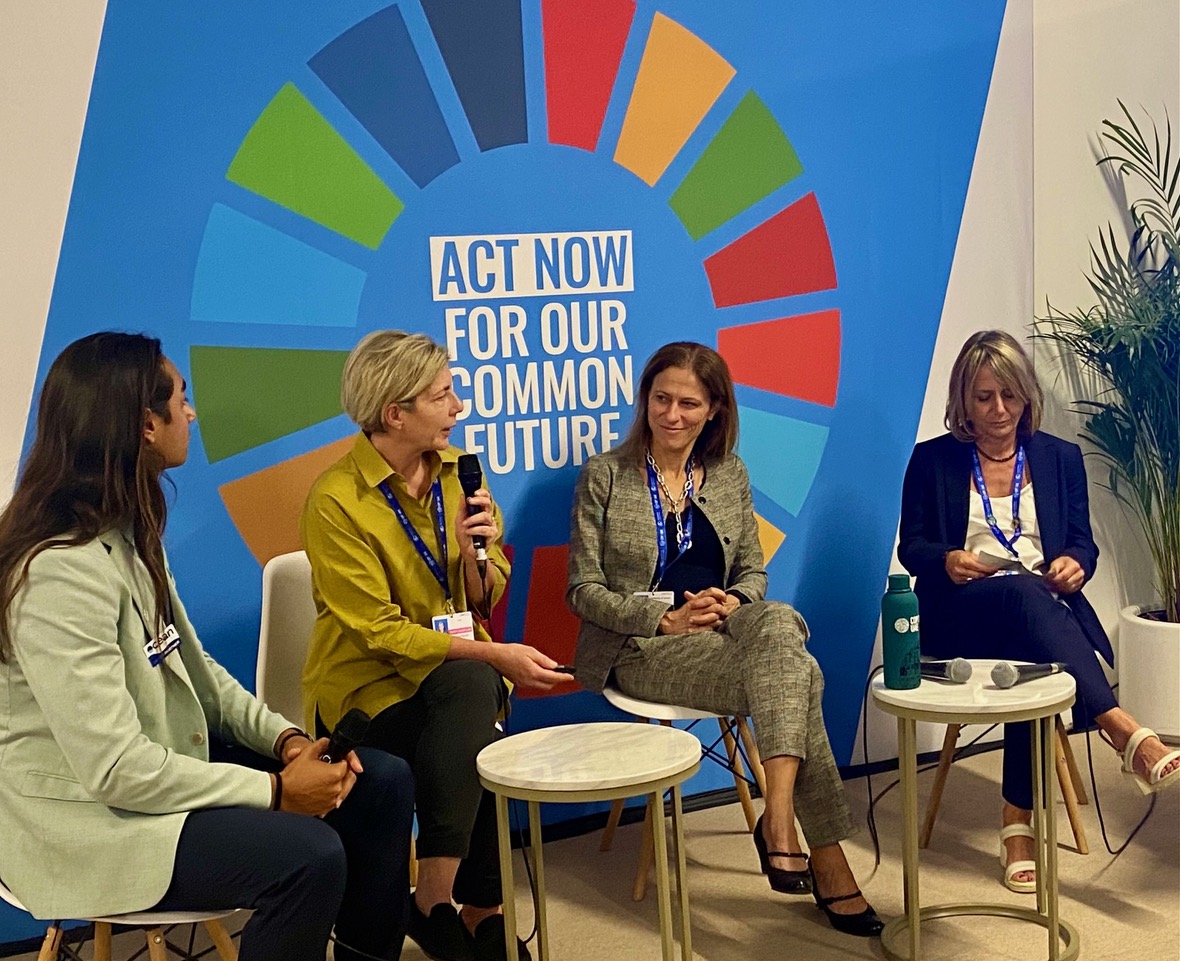
From left to right: Bodhi Patil (Ocean influencer), Vienna Eleuteri, Michela Gallo (University of Genoa) and Adriana Del Borghi (University of Genoa) at COP28.
The Agreements made at the summit will impact policy and regulations which will have different consequences on the industry—particularly driving the development of alternative technologies and their infrastructure to meet emission reduction targets. Secondarily, increased ocean conservation may also lead to restricted activities in vulnerable marine ecosystems.
Once again, however, controversy surrounds the achievements made during each year's summit, with many this year criticising that the language in the new agreement isn't strong enough. Many nations were initially aiming for stronger “phasing out” terminology but were prevented from being included in the agreement due to resistance from major oil-producing nations. This concern extends to those benefiting from the oil and gas industry, a recent Oxfam analysis has shown that a quarter of the billionaire delegates of COP28 made their fortunes from highly polluting industries. Paired with the presence of oil and gas lobbyists at the summit, this has caused some to question whether the right people are in the room for these discussions.
For people on the ground, however, the reaction was different. “Criticism online often comes from people who don’t realise the complexity and diversity of the yachting world. Some tend to throw all kinds of yachts into one category and simply don’t know that [Sunreef’s] biggest focus is promoting clean yachting and building electric yachts,” says Lapp.
“We had some interesting conversations with people who were genuinely interested in the solar power technology and autonomy of the yachts. This is because the people who attended are interested in the topic and already have some knowledge of the current challenges in the marine industry. Their reaction was less emotional and more tech-oriented,” he adds.
Decisions made at COP28 affect global economies, including the maritime industry. Beyond that, there are more relevant discussions in the offshoot panels and presentations that can discuss and advance the activities, policies, and initiatives that can both affect and be adopted by the yachting industry.
Regardless of the criticism, it is also important to note the strategies that are already in place as the industry continues to drive towards a more sustainable future “We are hard at work to provide answers to the challenges we face,” adds Eleuteri. “There is no more time for procrastination. This is the time for shared action and a unified voice from our industry. As in the COP28 youth warning – later is too late.”
Profile links
Water Revolution Foundation
Join the discussion
To post comments please Sign in or Register
When commenting please follow our house rules
Click here to become part of The Superyacht Group community, and join us in our mission to make this industry accessible to all, and prosperous for the long-term. We are offering access to the superyacht industry’s most comprehensive and longstanding archive of business-critical information, as well as a comprehensive, real-time superyacht fleet database, for just £10 per month, because we are One Industry with One Mission. Sign up here .
Related news
.jpg)
Boero presents its first sustainability report
The Boero Group defines its sustainability strategies

Startups to watch in 2024
With hundreds of millions invested in yachting startups over the course of 2023, Gabbi Richardson highlights the ones to watch in the new year

More sustainability jargon busting
Here, we explain more sustainability terms to equip you with an understanding of this fast-paced area

FarSounder joins sea mapping project
The forward-looking sonar technologies manufacturer has partnered with The Nippon Foundation to aid scientific research on the seafloor

Mixed messaging or meaningful change?
Megan Hickling, TSG’s new Sustainability Editor, argues that the superyacht industry should be taking major initiatives that can actually be measured

Can the industry print a better future?
3D printing could be the antidote that shipyards are looking for to enhance sustainability credentials
9 months ago
10 months ago
11 months ago
Sign up to the SuperyachtNews Bulletin
Receive unrivalled market intelligence, weekly headlines and the most relevant and insightful journalism directly to your inbox.
Sign up to the SuperyachtNews Bulletin
The superyachtnews app.

Follow us on
Media Pack Request
Please select exactly what you would like to receive from us by ticking the boxes below:
SuperyachtNews.com
Register to comment
- Hi, My Account Subscriptions --> My KT Trading Contact Us Privacy Notice Sign Out
Sun, Aug 25, 2024 | Safar 21, 1446
Dubai 20°C
- Expo City Dubai
- Emergencies
- Ras Al Khaimah
- Umm Al Quwain
Life and Living
- Visa & Immigration in UAE
- Banking in UAE
- Schooling in UAE
- Housing in UAE
- Ramadan 2024
- Saudi Arabia
- Philippines
- Cryptocurrency
- Infrastructure
- Currency Exchange
- Horse Racing
- Local Sports
Entertainment
- Local Events
Dubai World Cup
- Track Notes
- Big Numbers
- Daily Updates
- Arts & Culture
- Mental Health
- Relationships
- Staycations
- UAE Attractions
- Tech Reviews
- Motoring Reviews
- Movie Reviews
- Book reviews
- Restaurant Reviews
- Young Times
Supplements
- Back To School
- Eid-Al-Adha
- It’s Summer Time
- Leading Universities
- Higher Education
- India Real Estate Show
- Future Of Insurance
- KT Desert Drive
- New Age Finance & Accounting Summit
- Digital Health Forum
- Subscriptions
- UAE Holidays
- Latest News
- Prayer Timings
- Cinema Listings
- Inspired Living
- Advertise With Us
- Privacy Notice
KT APPDOWNLOAD

Clean energy sets sail: COP28 UAE spotlights green movement on waterways
Solar-powered vessels equipped with solar skin are making strides in the region, according to experts in the maritime industry.

Nandini Sircar
- Follow us on

Top Stories

UAE announces 2-month grace period for residence visa violators

UAE announces fee refund for tax service charges from August 1

Paid parking in Dubai: Residents face up to Dh4,000 extra yearly costs when new rates kick in

Published: Tue 5 Dec 2023, 6:07 PM
Clean energy vehicle movement is not only gaining traction on roads but is also expanding to waterways at COP28 UAE. Solar-powered vessels equipped with solar skin are making strides in the region, according to experts in the maritime industry.
For generations, waters have been integral to Dubai's inhabitants' lives. Whether for relaxation, discovery, travel, or fishing, the UAE's citizens and expats have always connected with the sea.
Nicolas Lapp, CTO and Co-founder of Sunreef Yacht, explains how their Eco range has innovative technology that integrates solar panels into the vessel's surface, allowing it to harness solar energy and convert it into electricity to power onboard systems or propulsion.
He said, "As boat builders, this sense of responsibility should be a fundamental element of boat design, building, and use. Companies should do whatever they can to come up with more sustainable craft. It's about adding sustainable solutions on board. It's not about reinventing the wheel. But the one time when we actually got close to reinventing the wheel was with our solar power system. This is unique. That's a technology that is not implemented on any other yacht. These are composite integrated solar panels, so we like to call it 'solar skin' today."
The Polish shipbuilder emphasised that integrating solar skin technology reduces reliance on traditional fuel sources, lowers operational costs, and contributes to a cleaner and more sustainable mode of transportation on waterways.
"We're able to fit the entire boat with solar panels. These solar panels are all over the hulls, superstructure and every surface possible. Hence, we can maximise solar energy. We feel this is a potential that hasn't been used enough in the yachting industry. Most leisure yachts navigate in sunny areas, and we really want to harness that power. To exploit that potential, one needs to maximise solar power surface."
Talking about the challenges, Lapp said his company first took some solar panels from the market, which were flat. Unable to fit this into their vessel's design, they decided to make the solar panel adaptable to the boat's shape.
"I knew of some car manufacturers working on that. It has taken us one year to develop the system, and we have achieved good results because our panels are less than one millimetre thick. So, it's easy to integrate them into the boat's structure, and the weight is less than 1.8kg per square metre. So, we were able to integrate this entirely on the boat. We've already launched five to six such boats," he added.
Change in cruising philosophy
These boats are powered entirely by clean energy, with solar panels and batteries feeding electric motors.
Storing energy holds equal significance to generating it. They use specially designed batteries to optimise the Eco boats' efficiency.
"There is also a great weight advantage to the solar panels if they're not based on glass and they are very thin, then that means it's very light. So that adds to the efficiency. I think it also changes the way we look at cruising. More and more customers realise that they cruise electric for a couple of hours and then stop to recharge with solar. Essentially, cruise a little, then stop to recharge, and then cruise again, and then stop to recharge. I think there's a change in the philosophy of cruising, and increasingly, people realise that generators are more of a backup than a necessity."
Sunreef Yachts' new shipyard
Meanwhile, construction has begun on Sunreef Yachts' new shipyard in Ras Al Khaimah, UAE. The company has partnered with the marine free zone and harbour, RAK Maritime City, on the project.
The new facility is part of Sunreef's global expansion strategy to strengthen the company's presence in the Middle East markets.
Their introduction to different regions indicates a growing interest in eco-friendly and renewable energy solutions within the maritime industry.
This collaboration with the UAE is particularly significant as the UAE boasts the most inexpensive solar power globally and hosts three of the most extensive solar complexes worldwide.
- First UAE-grown ‘repurposed EV’ to debut at COP28
- Why climate resilience is the foundation of cities of the future
- Shop green, be a hero: Uncover these local businesses in Dubai for a greener world
- [email protected]
More news from COP 28
Cop28 in uae: new draft climate deal pushes nations to ‘transition away from fossil fuels’.
The latest Global Stocktake Presidency Text was put out on December 13, 2023, just after 7am
cop 8 months ago -->
Look: How Emirati women keep heritage alive, pass traditional weaving skills to generations
During COP28 summit, elderly women from the community showcased the art of Al Sadu, a Bedouin craft and highlighted their cultural legacy
Watch: Santa Claus at COP28? Nope, it's 'Sustaina Claus' and he wants a better future for children
The civil rights activist is famous for his distinctive three-finger sign symbolising the harmony between society, environment, and economy
COP28 UAE delivers promise on food security, says climate minister
One landmark agreement that was reached is the Declaration on Sustainable Agriculture, Resilient Food Systems, and Climate Action
Dubai: Mother-son duo gathers 'eco-walkers', inspires residents to make lifestyle changes
Residents from all walks of life took turns in writing their names on a big wall of pledges
COP28 UAE runs overtime: Draft deal, fossil fuel debate explained
Nearly 200 nations were pressed to reach an ambitious deal by the official end of talks today — but a consensus is yet to be reached; here's why
COP28: How cities can stay cool while cutting carbon emissions
According to the first-ever Global Cooling Watch Report launched at COP28, cooling demand could triple by 2050
COP28 in UAE: Final stocktake report to be delivered today
A draft was released on Monday calling for countries to reduce 'consumption and production of fossil fuels, in a just, orderly and equitable manner'
Type your keywords

- Green Propulsion
- Renewable Energy
- Energy efficiency
- Sustainable materials
- Eco Insights
- News & Events
- Sunreef News Magazine
- Press About Sunreef

- 60 Sunreef Power
- 70 Sunreef Power
- 80 Sunreef Power
- 100 Sunreef Power
- Sunreef Supreme Power
- Sunreef Ultima Range
- Sunreef 44 Ultima
- Sunreef 55 Ultima
- Sunreef 66 Ultima
- Sunreef 77 Ultima
- Sunreef 88 Ultima
- Sunreef fleet

- Sunreef Zero Cat
- Sunreef 100
- Sunreef Fleet

- Sunreef 35M
- Sunreef 43M
- 49M Sunreef Power
- 210 Sunreef Power Trimaran
- Sunreef Explorer
- 40M Sunreef Explorer
- 40M Sunreef Explorer Eco
- 50M Sunreef Explorer
- Superyachts Fleet
Meet the Sunreef Yachts Eco Team at the COP28

Meet the Sunreef Yachts Eco Team at COP28 and learn more about the latest technical developments in responsible yachting. Company representatives will be more than happy to meet you in the Technology & Innovation Hub 2 throughout the entire event.
DISCUSSION PANEL: RESPONSIBLE YACHTING TODAY & TOMORROW
On December 5th Sunreef Yachts Eco representatives, Nicolas Lapp (CTO) and Artur Poloczanski (PR) will be hosting the “Responsible Yachting: Today & Tomorrow” discussion panel in the Green Zone. You are invited to join the event and get exclusive insight into the latest marine green technology.
ULTIMA RANGE
Previous post sunreef yachts dynamic / young / creative, next post speed champion tim ciasulli orders a sunreef 88 ultima.
Comments are closed.
SUBSCRIBE TO OUR NEWSLETTER
- Sailing Yachts
- Power Yachts
- Superyachts
- Making a Change
- Green Concept
- Energy Efficiency
- Sustainable Materials
Copyright © 2024 Sunreef Yachts . All rights reserved.
- Whistleblowing
- Privacy Policy

Sunreef Venture S.A.
Sunreef Yachts Shipyard
ul. Tarcice 6
80-718 Gdańsk, Poland
+48 58 769 77 77
- IMO at COP 28
- Marine Environment

The 2023 UN Climate Change Conference (COP 28) will be held in Dubai, United Arab Emirates, from 30th November 2023 to 12th December 2023.
IMO will participate in the conference to showcase its commitment to reduce GHG emissions from shipping and the 2030 Agenda for Sustainable Development.
IMO actively participates in each COP and other relevant UNFCCC meetings, as appropriate. IMO reports to the Subsidiary Body for Scientific and Technological Advice (SBSTA) are available here .
Please see below for information on more maritime-related events at COP 28.
Global Stocktake
The first Global Stocktake of the implementation of the Paris Agreement will conclude at COP 28.
IMO's submission for the first Global Stocktake is available here.
IMO's objectives for COP 28
IMO's main objectives for the Dubai Climate Change Conference (COP 28) are, in all communications, to seek to make clear that:
- international shipping is indispensable to the world and is a vital industry to support the UN Sustainable Development Goals and the global energy transition; and
- as its track record to date so clearly demonstrates, including through the adoption of the 2023 IMO Strategy on reduction of GHG emissions from ships in July 2023, IMO is the appropriate international body to continue work to address GHG emissions from ships engaged in international trade.
Maritime-related events at COP 28 (see also COP 28 side events )
| 59th Subsidiary Body for Scientific and Technological Advice (SBSTA 59) IMO Secretariat to update on IMO's work under agenda item 12(b) – "Emissions from fuel used for international aviation and maritime transport" | With IMO participation | Thursday, 30 November to 6 December 2023 | Conference venue |
| Green Shipping Leading the Global Energy Transition | Denmark, France, US and Norway | Friday, 01 December 2023, 15:30—16:30 | MR 12 Classroom |
| ICAO, IMO, IRENA | Saturday, 02 December 2023, 18:30—20:00 | SE Room 3 (125 pax) | |
| Decarbonising shipping and logistics | WTO | Saturday, 02 December 2023, 10:30-11:30 | Tradehouse Pavilion |
| Decarbonization to support the achievement of NDC and Net Zero Emission Target | Indonesia with IMO participation | Saturday, 02 December 2023, 12:00-13:20 | Indonesian Pavilion |
| Coordinating for greater ocean-based climate change ambition: A UN-Oceans perspective | OLA, FAO, IOC/UNESCO, IAEA, UNFCCC, UNCTAD, UNDP | Monday, 04 December 2023, 11:30 -13:00 | SE Room 7 (125 pax) |
| Ocean-Climate-Society: the UNFCCC & ocean mitigation, adaptation, finance and capacity building | SE Room 7 (125 pax) | ||
| Conversation on the current status, challenges, and opportunities from decarbonizing aviation and maritime sectors | King Abdullah Petroleum Studies and Research Center (KAPSARC) | Monday, 04 December 2023, 15:00 -15:45 | Blue Zone Thematic Arena 4 |
| Maritime resilience event | Resilience Rising, Arup, LRF | Monday, 04 December 2023, 17:45-18:45 | Resilience Hub |
| Fueling the green transition: how to radically increase the world’s production of green fuels | Mærsk Mc-Kinney Møller Center for Zero Carbon Shipping, DP World, Topsoe and MAN Energy-Solutions | Tuesday, 5 December 2023, 12:30 - 13:30 | Danish Pavilion |
| Staying on Course for 1.5: Africa's Role In Accelerating Shipping’s Green Transition | Sustainable Shipping Initiative (SSI), Lloyd's Register (LR) | Tuesday, 5 December 2023, 15:00 - 16:30 | SE Room 6 (125 pax) |
| The vital role of ship recycling-reducing global GHG emissions and contributing to circular economy | The Baltic And International Maritime Council (BIMCO), Vanderbilt University, with IMO participation | ||
| Decarbonizing Maritime Ports of Los Angeles | U.S. Department of Transportation, Port of Los Angeles, Blue Sky Maritime Coalition, Aspen Institute, and U.S. Department of Energy | Wednesday, 6 December 2023, 08:30 – 09:30 | U.S. Center |
| Can Shipping Help Save the Ocean? A dialogue on Science, Education and Informed Policy-Making | U.S. Department of Transportation, Pacific Ocean Commissioner, Scripps Institution of Oceanography, and U.S. NOAA | Wednesday, 6 December 2023,12:30 – 13:30 | Ocean Pavillion, Main Theatre |
| Towards Green Shipping by 2050 | Ministry of Oceans and Fisheries, Republic of Korea | Wednesday, 6 December 2023, 10:00 -10:45 | Korea Pavilion |
| Nordic green shipping event | Nordic Cooperation | Wednesday, 6 December 2023, 10:30-11:30 | Nordic Pavilion |
| Stop Arctic meltdown - a Call for Rapid Action by Shipping to Slow Arctic Melting | | Wednesday, 6 December 2023, 11:30 - 12:30 | Cryosphere Pavilion |
| Green corridors: a how to-guide | Mærsk Mc-Kinney Møller Center for Zero Carbon Shipping, the government of Chile and NYK Line | Wednesday, 6 December 2023, 11:40 - 12:30 | Danish Pavilion |
| | Government of the United Kingdom of Great Britain and Northern Ireland | Wednesday, 6 December 2023, 12:00-13:00 | UK Pavilion |
| Navigating the Future: Boosting sustainable alternative fuels in shipping | European Commission | Wednesday, 6 December 2023, 12:00-13:30 | EU Pavilion |
| Accelerating decarbonization of shipping with hydrogen-based fuels | Mærsk Mc-Kinney Møller Center for Zero Carbon Shipping, | Wednesday, 6 December 2023, 13:00 - 12:00 | Global Climate Action Zone |
| To register: | | Wednesday, 6 December 2023, 15:00 - 17:30 | Singapore Pavilion |
| | Sustainable Shipping Initiative (SSI), UNF, CCT | Friday, 8 December 2023, 11:30-13:00 | |
| IMO, UNCTAD, IRENA | Saturday, 9 December 2023, 11:30-13:00 | SE Room 4 (125 pax) | |
| The Green Shipping Challenge: Accelerating the Zero Emission Transition | U.S. Department of State, C40 Cities, and the Aspen Institute | Saturday, 9 December 2023, 09:00-10:00 | U.S. Center |
| Ocean High Level Event: Powering ocean breakthroughs with 100% sustainable ocean management | COP28, High Level Panel for a Sustainable Ocean Economy; Ocean Action 2030; Ocean & Climate Platform on behalf of the Marrakech Partnership; High-Level Climate Champions | Saturday, 9 December 2023, 14:00-15:00 | Al Waha Theatre |
| UNCTAD with FAO, IMO, UNWTO, OECS and IOI | Saturday, 9 December 2023, 15:00-16:00 | Trade House Pavilion | |
| High-Level Maritime Roundtable: Shipping as a leading sector for climate action: turning commitment into action and to advance the energy transition | COP Presidency (UAE), IMO, ICS and UN Foundation. | Saturday, 9 December 2023, 16:30-17:30 | WCAS Theatre |
- International edition
- Australia edition
- Europe edition

Cop28 diary: video games, solar-powered yachts and colossal fossils
Second week of UN climate summit includes some unusual entertainment and ‘honours’ for environmental inaction
- Cop28 live – latest updates
Game on: Dubai police get creative
One of the strangest tie-ins to the climate conference must be the Cop28 Adventures mobile game that was released by Dubai police before the event.
The game lets users “explore stunning UAE locations, make impactful decisions and compete for the highest cooperation score”. Playing as a conference delegate, you can “craft policies, solve environmental challenges and collaborate with players worldwide”.
The game is credited to the Dubai police, whose previous offerings include:
My Rights and Duties (“learn about your rights in a fun and simple way”).
My Child, My Friend (“aims to enhance communication and friendship between parents and their offspring”).
Stay Safe (“educating the public in all its categories of positive behaviours that must be adhered to and some negative behaviours that must be avoided”).
It also appears to have drone racing, which is not usually part of the real-world delegate experience. Perhaps it will inspire future hosts to consider whether gamifying the negotiations may be what is needed to speed up climate action. AE
‘Responsible’ superyachts up for grabs
If you have ever wanted to glide around the increasingly superheated seas on a yacht but worry about feeling guilty, then rejoice: “responsible” yachting has come to Cop28 .
Sunreef Yachts, a Polish yacht-maker, held an event under the scorching Dubai sun extolling its range of solar-powered vessels. The company’s representatives acknowledged the rather ungreen image of superyachts, admitting that the 300 biggest boats in the world cause as much emissions as 10 million people.
“We have to realise at first that yacht-builders have a bad reputation in general in the area of all things sustainable,” said Artur Poloczanski, the PR director of Sunreef.
The emissions from yachts were “scary”, Poloczanski admitted, but “it’s fair to say the yachting environment is very diverse. We are here to discuss the alternatives.”
Several Sunreef yachts contain a solar “skin” that can generate power, stored by batteries. Some can run on hydrogen fuel cells, too. However, the company also sells extremely large vessels that contain private spas, gyms, outdoor cinemas and space for jetskis, powered by tanks holding up to 5,200 gallons of fuel. OM
And the fossil of the day award goes to …

During the conference, the campaign group Climate Action Network (CAN) hands out daily awards for the “fossil of the day” for undermining environmental action. The recipients are voted for by the groups’s thousands of international members.
The first to receive this dubious honour was New Zealand, whose new government plans to expand oil and gas exploration. Next up was Brazil, for its decision as the conference opened to align itself with Opec, and for the country’s planned oil expansion.
Other laureates include the US, the world’s biggest polluter, which CAN criticised for weakening the language of official texts, and the Canadian province of Alberta, whose premier, Danielle Smith, used to work as a fossil fuel lobbyist and who the group accuse of attempting to sabotage negotiations.
The “colossal fossil” award, for the biggest villain at the talks, will be presented next week, where the US will be hoping not to defend its crown. AE
- Climate crisis
- Greenhouse gas emissions

Cop28 president says his firm will keep investing in oil
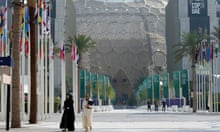
Cop28’s winners and losers: from fossil fuel firms to future generations

‘The future is renewable’: How a huge gamble sealed Cop28 deal

Cop28 failed to halt fossil fuels’ deadly expansion plans – so what now?

Indigenous people and climate justice groups say Cop28 was ‘business as usual’

Good Cop, bad Cop: what the Cop28 agreement says and what it means
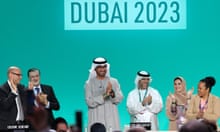

Cop28 landmark deal agreed to ‘transition away’ from fossil fuels

After 30 years of waiting, Cop28 deal addresses the elephant in the room

Cop28: second draft text of climate deal calls for ‘transitioning away’ from fossil fuels

Critical or concerning? Cop28 debates role of carbon markets in climate crisis
Most viewed.
COP28: What key issues will be discussed at UN climate change conference?
- Medium Text
TAKING STOCK OF CLIMATE PROGRESS
Future of fossil fuels, technologies to tackle emissions.
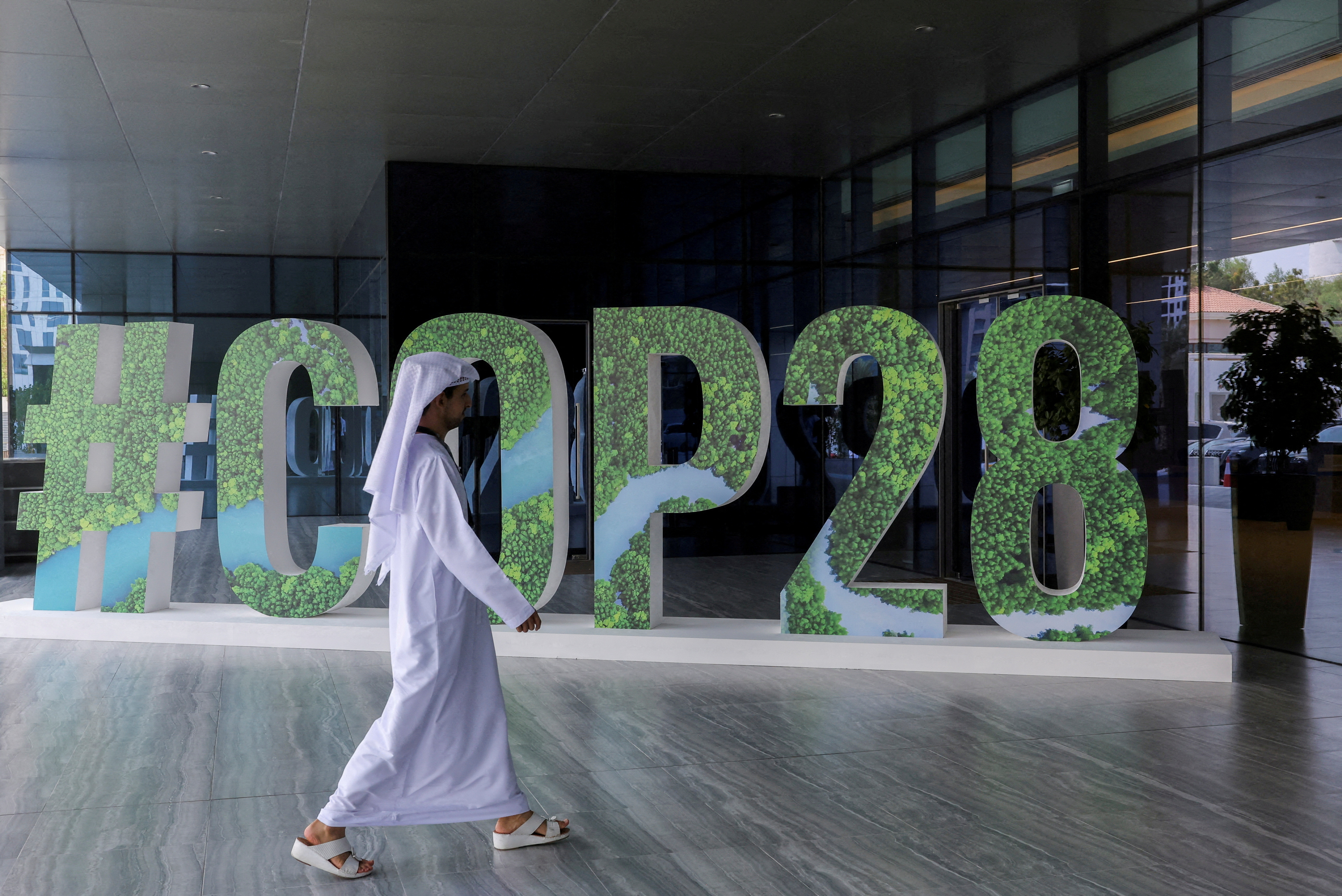
BOOSTING CLEAN ENERGY CAPACITY
Financing for the costs of climate change, 'side deals'.
Sign up here.
Reporting by Kate Abnett; Editing by Katy Daigle and Josie Kao
Our Standards: The Thomson Reuters Trust Principles. , opens new tab

Thomson Reuters
Kate Abnett covers EU climate and energy policy in Brussels, reporting on Europe’s green transition and how climate change is affecting people and ecosystems across the EU. Other areas of coverage include international climate diplomacy. Before joining Reuters, Kate covered emissions and energy markets for Argus Media in London. She is part of the teams whose reporting on Europe’s energy crisis won two Reuters journalist of the year awards in 2022.
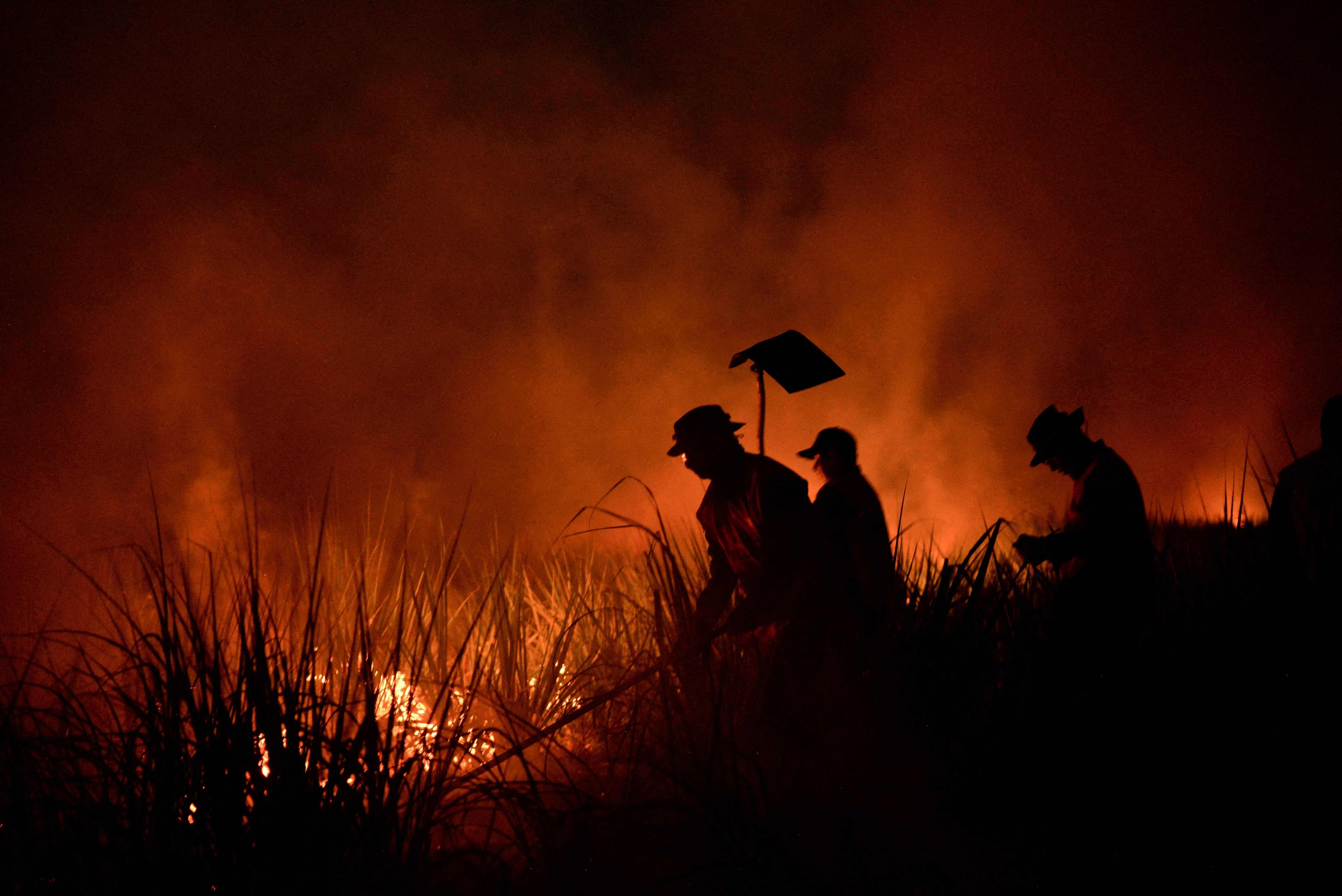
Bank of China President Liu resigns, chairman to be acting president
Bank of China Vice Chairman and President Liu Jin resigned for personal reasons effective on Sunday, the bank said.

RTI uses cookies to offer you the best experience online. By clicking “accept” on this website, you opt in and you agree to the use of cookies. If you would like to know more about how RTI uses cookies and how to manage them please view our Privacy Policy here . You can “opt out” or change your mind by visiting: http://optout.aboutads.info/ . Click “accept” to agree.
COP28: Looking Back and Moving Forward
- Share on Facebook
- Share on X.com
- Share on Linkedin
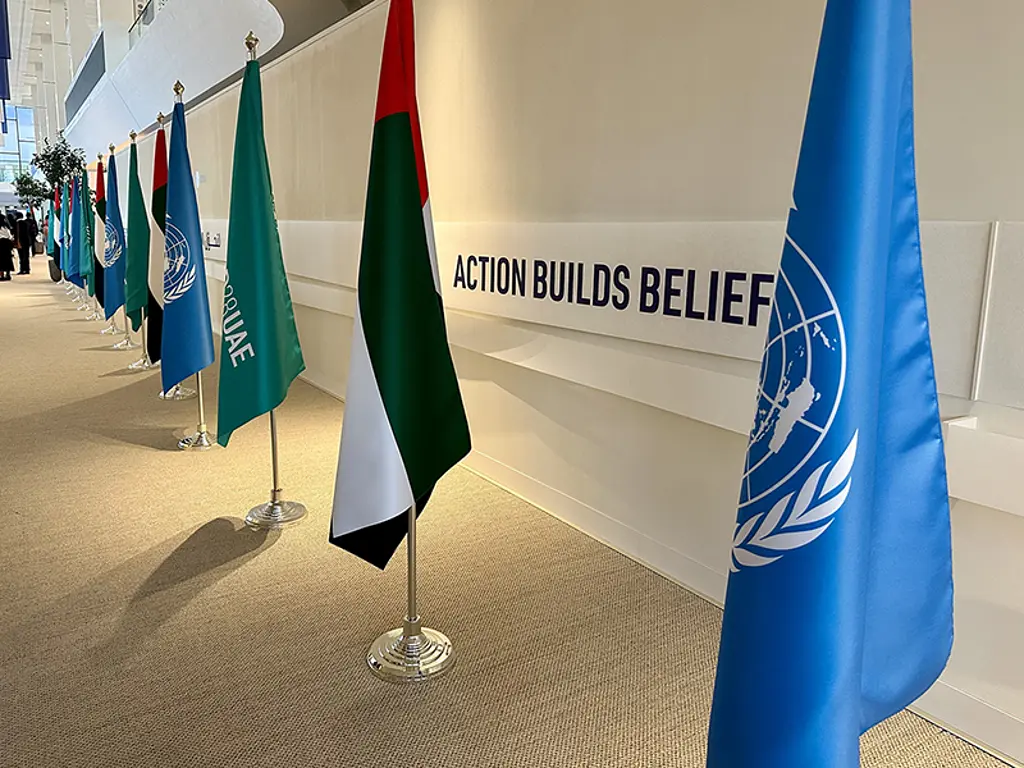
Although COP28 has concluded, the urgency of the climate crisis persists. As we press forward, turning dialogue into action is paramount. Every partnership formed, lesson learned, and insight gained during COP28 is a resource to create tangible, lasting impact to address the challenges created by climate change. COP28 was a checkpoint, not a finish line. During COP28, we actively participated in a diverse array of events, engaging with and learning from our climate colleagues. Our team members shared expertise in water, health, energy, agriculture, economics, finance, and policy, as well as advanced the goals of our partnership with the Caribbean Community Climate Change Centre.
Here are our key takeaways from this year’s COP, coupled with insights into the essential actions required to reduce global emissions and strengthen climate resilience.
New and noteworthy COP28 highlights
COP28 was historic in several ways. For the first time, language was adopted regarding transitioning away from fossil fuels — a deal facilitated by UAE’s Sultan Al Jaber, who represents both an oil company and a country reliant on fossil fuels. This agreement was complemented by across-the-board recognition, including from the world’s largest oil and gas producers, that we need to reduce methane emissions to reach 2030 targets. While no specifics were offered on how we will transition away from fossil fuels, an agreement was reached to triple renewable energy capacity globally and double the global average annual rate of energy efficiency improvements by 2030. It will now be up to national policymakers, local communities, the private sector and other stakeholders to do the work on the ground to turn these pledges into action.
This was also the first COP that explicitly focused on the widespread impact of climate change on the health of communities around the world. The global health research, advocacy, and implementation community showed up in force to highlight the human cost of climate change and push for action. Only one national health minister attended COP27—this year, 60 health leaders were in attendance from Africa, Asia, South America, and the Middle East spotlighting their countries' concerns and commitments.
The Declaration on Climate and Health , which unveiled a set of 10 principles to bolster financing for climate and health, mobilize new and additional finance, and foster innovation with transformative projects and new multi-sector approaches, was endorsed by over 120 countries and more than 40 financing partners and civil society organizations. The COP28 Guiding Principles for Financing Climate and Health Solutions signaled the growing collaboration across funders and the momentum to support climate and health solutions in a sustainable manner. Collectively, these partners have committed to dedicate $1 billion to address the expanding climate-health crisis.
COP28 also delved into the role of agriculture in building resilient food systems and addressing climate change such as by improving soil health and reducing food waste/loss. The Declaration on Sustainable Agriculture, Resilient Food Systems, and Climate Action , endorsed by 159 countries, calls for food and agriculture to be formally added to the goals of the Paris Agreement.
We repeatedly heard that agriculture has a part to play – with encouraging news that substantial emission reductions can be achieved through relatively simple changes and existing technology. For example, the Australian beef association improved its agroforestry and pasture management and reduced emissions by 65%. Such impressive results motivate us as we launch a new AIM for Climate Innovation Sprint to reduce methane emissions from dairy cattle kept by smallholder farmers, starting with Ethiopia, Africa’s largest provider of livestock.
Simultaneously, COP28 underscored water as a critical resource affected by climate change, officially recognized as part of the official agenda only a year prior at COP27. Many speakers agreed that the climate crisis is a water crisis, with most impacts and damages occurring due to either excess or insufficient water.
COP28 was the largest climate conference to date, with 85,000 participants, including negotiators and observers . In addition, the participation of youth was much stronger and there were several youth pavilions and other institutional changes to support their participation.
Focus on climate finance initiatives at COP28
Climate finance remains a priority topic, with growing awareness of the need to provide finance for adapting to climate change. Developed countries and the private sector are slowly beginning to provide the support that developing countries need to meet climate targets. The UAE pledged $30 billion for new investments in climate-friendly projects, including $5 billion for the Global South. Latin America is earmarked for climate investments of $2 billion annually through 2030, while $10 billion has been allocated for climate investment in the Philippines between 2024 and 2029. Some 31 countries have pledged $12.8 billion to the Green Climate Fund .
A historic COP moment was the first-day decision operationalizing the “loss and damage fund,” which was established at COP27, where wealthy nations compensate developing nations for damages incurred by a crisis they did not create. Wealthy nations provided initial pledges to capitalize the fund with over $700 million. While this amount does not close the gap in finance needed for combating climate change, it signaled a step in the direction of climate justice for these vulnerable countries.
In addition to such pledges, there is a recognition that avoiding the worst impacts from climate change requires looking at opportunities to decarbonize and reduce emissions across all sectors – maximizing the use of existing solutions, deploying new technologies, and adopting other strategies to address climate change. To do this, we need to better leverage the private sector; the full force of private and public resources is the only hope to meet the funding needs.
One solution that was highlighted was the use of carbon markets as a means of scaling up activities such as forestry, land use, and renewable energy that can offset emissions produced elsewhere. When they work as intended, markets can engage the private sector at scale and channel climate finance to communities and local actors to help mitigate or adapt to climate change. However, recent scandals in the industry have illustrated the need for enhanced quality control and transparency. New technologies, methodologies, and regulations were all promoted at COP to increase confidence that offsets can deliver reliable carbon emissions reductions going forward. The COP did not succeed in adopting rules for global carbon markets (implementing Article 6 of the Paris Agreement), and negotiations will continue at the next COP.
Pick up the pace for climate solutions
While some progress has been made, we are not moving fast enough. Though much of the COP28 discussion focused on limiting global warming to 1.5°C, compared to pre-industrial levels, by 2050, it was accompanied by the acknowledgement that the parties are woefully behind in taking real steps to meet global warming goals. We are already at 1.3°C and unfortunately, 2023 was another year of increased coal production. According to IEA , “Global coal production is forecast to have risen by 1.8% in 2023, with continued growth in India, China and Indonesia more than offsetting declines in the United States and the European Union.”
In addition to our conversations on reducing emissions and meeting climate-related targets, we need to pay more attention to the impacts we are seeing today. We are experiencing the effects of climate change today, with stronger hurricanes, more severe non-tropical rainfall events, an increase in climate-sensitive diseases, and longer droughts occurring around the world. Low-lying countries and small developing island nations cannot wait 20 more years for the world to phase out fossil fuels as they are already losing habitable land.
Talking to and hearing from people on the ground — the farmers, island governments, emergency managers, and other local people dealing with climate change impacts — reiterated for us that climate solutions need to be swift and locally led. Around the world, people remain focused on building and strengthening climate resilience in their communities, but they need financial help to improve their own livelihoods, resilience, and health.
Charting a sustainable path forward amid climate challenges
We have reached a place where we must look at every sector and every viable technology and solution that is available, while seeking even greater impacts by exploring the nexus of food-energy-water and the nexus of climate-health . We need to decarbonize energy and transportation, protect and increase nature-based solutions , avoid building anything that is not climate resilient, make sure societies are planning for a climate-changed world, and communicate the behaviors that are needed to reduce emissions and adapt to climate impacts.
It’s essential to keep investing in improving climate science while vastly increasing funding for mitigation and resilience efforts. Mitigation priorities must include agriculture, which is challenged to reduce its emissions while producing 56% more food by 2050, as well as expanding the share of renewable energy in the global energy mix, displacing generation based on fossil fuels, transitioning to electric vehicles, and implementing energy saving and efficiency measures. We collectively need more climate finance flows going into adaptation and mitigation projects, along with innovations in climate finance and stronger private sector participation.
It’s no longer enough to measure climate change or climate responses in terms of global temperature change or total volume of greenhouse gas emissions. Rather, we must also discuss climate change in terms of lives lost and lives saved. Everything we do should be viewed from a lens of climate change, regardless of the sector.
Learn more about RTI’s Center for Climate Solutions .

The A-to-Z of COP28: priorities, challenges and expectations

As the world’s most important summit – the 28th edition of the UN Climate Conference – opens in Dubai, there is no doubting the high level of expectation the international community holds for COP28.
Taking place from November 30 to December 12, and convening 70,000 participants from heads of state to climate envoys, business leaders to lobbyists, the two-week-long climate conference comes weeks after a UN report said greenhouse gases in the atmosphere hit a record high in 2022 – while 2023 is on track to be the planet’ hottest year on record.
Progress by countries to cut their planet-warming emissions has been slow and inadequate, with a recent UN report warning that warming could reach 3 degrees Celsius above the pre-industrial average by the end of the century.
The urgency to take action – and to wean off fossil fuels has never been greater.
Claiming to be the most “inclusive” COP yet, Dr Sultan Al Jaber , Minister of Industry and Advanced Technology and COP-28 President-Designate, has been travelling around the world in the lead-up to the summit meeting global leaders and leaving no stone unturned when it comes to addressing the four pillars set out for COP28.
Those pillars are fast-tracking the energy transition, fixing climate finance, focusing on adaptation to protect lives and livelihoods, and underpinning everything with full inclusivity.
Along with the Global Stocktake, the first assessment since the Paris Climate Accord in 2015, the hot-ticket topics up for debate, discussion and (hopefully) consensus will especially focus on reining in fossil fuels and on climate financing.
Here, in our A-to-Z of COP28, we address the priorities and challenges, hopes and expectations of the conference.

A – Activism allowed
While in the UAE, unauthorised protests are not allowed, an agreement has been reached between the executive secretary of the UN Framework Convention and the UAE government to provide a space for “climate activists to assemble peacefully and make their voices heard”.
Located in the Green Zone at Expo City Dubai, the Voices for Action hub will provide a dedicated area to hold protests and demonstrations for climate action.
But activists have raised concerns, with Climate Justice Coalition lead spokesperson Asad Rehman saying: “We are deeply concerned about people being detained and arrested.”
Among activists attending, the 25-year-old Ugandan founder of Africa-based Rise Up Movement , is perhaps most well-known. She will be attending various side events, including a discussion on climate-induced migration from the world’s most vulnerable nations.
B – Brazil is back
As the potential host of COP29 in 2024, all eyes will be on Brazil and their ambitious plans for climate action – with Brazil's President Luiz Inacio Lula da Silva believing Brazil’s return to green goals is set to steal the show at COP28.
Having largely delivered on his promise to curb the destruction of the Amazon rainforest, marking a pivot of predecessor Jair Bolsonaro’s policies, Lula is now heading to COP28 amid plenty of plaudits and armed with an ambitious new plan.
Since he took office for a third time in January, the veteran left leader has halved deforestation in its giant share of the Amazon versus last year (to the lowest level since 2018) and has pledged to eliminate illegal deforestation by 2030. Brazil is the world’s largest rainforest nation and contains some 60% of the Amazon jungle.
His recent successes give him substantial negotiating power and clout at the upcoming talks and according to the country’s top climate negotiator Andre Correa do Lago, Lula plans to use it as leverage to push for a loss and damage fund.
Brazil plans to propose the idea of a tropical forest conservation fund, where wealthy nations pay tropical forest countries for every hectare of preserved forest land. Brazil is among the nations vulnerable to climate risk, having experienced extreme weather including drought this year.
Different to most funds, this one wouldn’t value forest conservation in terms of carbon – as prevention of GHG is the goal, with value likely instead to be linked to the area of forest measured in hectares.
"It's a conceptual proposal with a view to create a fund to help conserve tropical forests around the world...in 80 countries," Correa do Lago said.
C – COP Controversy
The decision to hold the conference in the UAE and appoint the CEO of an oil company as President, has not been without criticism.
The appointment of an oil boss (Dr Sultan Al Jaber) as President of COP28 by the UAE, the world’s seventh-biggest oil producer, sparked a backlash from some climate activists who say Al Jaber’s role as ADNOC chief executive represents a clear conflict of interest with the COP28 position.
Teresa Anderson , global lead on climate justice at non-profit ActionAid said the UN Climate Summit was “increasingly being hijacked by those with opposing interests” and that the oil industry was trying to use COP summits as an “opportunity for greenwashing in a way that puts our planet’s future at risk”.
Others argue that oil giants must be at the negotiating table to deliver a practical solution – and that Al Jaber is uniquely positioned to bring about pragmatic solutions.
US Special Presidential Envoy for Climate, John Kerry, has called the UAE oil chief a “terrific choice”, arguing that you can’t tackle emissions without the fossil fuel companies in the room.
In the week leading up to COP28, more controversy arose when The Independent claimed to have seen leaked briefing documents prepared by the UAE’s COP28 team for meetings with foreign governments that revealed plans to discuss fossil fuels deals with 15 nations.
Al-Jaber has strongly denied the accusations of using the climate talks to strike fossil fuel deals for the UAE’s state-owned oil and gas company, saying: “These allegations are false, not true, incorrect, and not accurate. And it’s an attempt to undermine the work of the COP28 presidency.”
“Let me ask you a question: Do you think the UAE, or myself, will need the COP, or the COP presidency, to go and establish business deals or commercial relationships?"
But the latest controversy – and not one focused on the UAE, but the UK – with UK high-profile attendees to COP28, King Charles III, Prime Minister Rishi Sunak, and Foreign Secretary David Cameron, all taking separate private jets to the conference in Dubai, according to Downing Street.
D – Developing nations
When it comes to the COP28 agenda (the issues to negotiate and be decided on) there are 16 suggested additions, a record number for a COP.
Among these are several from the coalition called the Like-Minded Group of Developing Countries (LMDC) . The Group, led by Senegal's government climate head Madeleine Diouf Sarr, is a 46-member negotiating bloc that includes China, India, Saudi Arabia, Bolivia, and many countries in Africa.
Their view is that rich countries should be providing more climate finance. It is estimated that US$2.4 trillion will be needed annually by 2030 to address climate change in emerging markets and developing economies.
Sarr and coalition argue that while the developing countries are home to more than 4% of the world’s population, they use just 1% of emissions, and should be compensated for damages received. (See Loss and Damage). They have proposed negotiations on doubling adaptation finance support from developed countries.
This view is backed by The Group of 77 , a coalition of 77 developing countries and China that also holds that rich countries have a bigger responsibility to cut CO2 than poorer nations.
E – Energy efficiency
Energy efficiency is sure to be a hot topic, with the International Energy Agency’s (IEA) calling for a stronger policy on energy efficiency in 2024. This follows the release on the eve of COP28 of their Energy Efficiency 2023 report which shows that not enough progress is being made – revealing a slowing in global improvements in energy intensity.
IEA has said that doubling the rate of energy efficiency globally to at least a 4% energy intensity improvement each year up to 2030 is needed to put the world on track to reach net zero.
With this, Danish multinational Danfoss president and CEO Kim Fausing has called on governments at COP28 to commit to this doubling the rate, from 2% in 2022 to 4% in 2030.
He points to the need for much stronger policy packages of information, regulations and incentives and a tripling of global investment in energy efficiency and electrification as vital.
“We need to see direct action on energy efficiency from leaders at COP28 if we are to limit global warming to 1.5C. We have virtually no chance of meeting our future energy needs, and certainly no chance of achieving net zero by 2050 if we don’t radically rethink energy efficiency as a key tool to decarbonise society.”
Among the policy recommendations for leaders at COP28, to incentivise energy use during times of plentiful renewable energy with dynamic energy pricing, to make a plan for electrification, and to include flexibility solutions in energy policy at all levels.

F – Faith Pavilion
In a climate conference first, the Faith Pavilion takes to the Dubai stage at COP28 – and will convene more than 300 faith leaders, public figures and 70 leading faith-based organisations.
Hosted by the Muslim Council of Elders in collaboration with the COP28 Presidency, UNEP, and a coalition of faith partners, the pavilion has been designed as a “pioneering space to foster meaningful interfaith collaboration and engagement, with the goal of catalysing effective and ambitious climate action”.
The space will host dialogues and sessions promoting climate justice collaboration among religious and indigenous repreentatives, scientists, young people, and political leaders with leading speakers including Sri Sri Ravi Shankar and Jagadish Vaudev (popularly known as Sadhguru) – one of India's most powerful gurus.
The 87-year-old spiritual leader is founder of non-profit Isha Foundation , has an Instagram following of 11.1 million, a New York Times bestselling self-help book ( Inner Engineering ) and a celebrity following that includes Will Smith, Matthew McConaughey and Andrea Bocelli.
G - Global stocktake (GST)
COP28 is an important year for the Paris agreement. Signed in 2015, in Paris, countries agreed to mark each other’s homework every five years beginning in 2023. Referred to as the Global Stocktake, countries will for the first time assess how they are measuring up to the goals of the Paris Agreement., it will examine what has been achieved and what more needs to be done.
And this will form the basis for the next round of country pledges to cut emissions, due in 2025.
Even before the stocktake begins, the UN has said the world is way off track in keeping to the 1.5C goal and emissions that contribute to global warming must be slashed to stay on track.

H – Health Day
As health gains traction as a central motivator for climate action, COP28 will deliver the first official Health Day. In collaboration with the World Health Organisation and the Wellcome Trust and partners, the Health Day will focus on five key topics and feature a rollout of events.
Among topics to be addressed, how climate change affects our health, how ambitious emission reductions can save lives, how adapation and resilience can address the health impacts of climate change, mental health and climate change, and the role of development banks and financial institutions.
WHO and Wellcome Trust will also host the COP28 Health Pavilion, which will convene everyone from ministers to health professionals to business leaders. Discover the online course "Climate Change Negotiations and Health" which will be updated with content relevant specifically to the upcoming negotiations.
I – Inclusivity including Indigenous Peoples
Having a voice at COP has not always been easy, and Dr Al Sultan Al Jaber is keen to address that by making COP28 the most inclusive climate change conference yet – including a youth delegate programme, a pavilion for indigenous people, and higher numbers of regional and local leaders.
“We are inviting every segment of society to join us at COP28 – policy makers and passionate advocates, engineers and entrepreneurs,” said Dr Al Jaber.
The COP28 Presidency believes inclusivity is a critical enabler to achieving transformative progress across the climate agenda. Only by rising above our differences and working together can we raise our shared ambition and deliver progress to keep 1.5C within reach.”
As part of this inclusivity, the COP28 Presidency has announced new measures to enhance the effective participation of indigenous peoples and authentic visibility of Indigenous People-led solutions at COP28, among these financial support for Indigenous elders to attend the Conference and subsidised accommodations for 150 delegates from Indigenous organisations.
According to Razan Al Mubarak, UN Climate Change High-Level Champion for COP28, “Indigenous Peoples are one of the nine official constituencies – organisations which have the status of observers – in the UN Framework Convention on Climate Change. Still, their valuable perspectives remain underrepresented in multilateral climate processes, and they receive a very small share of the international funding for climate action.”
J – Just Transition
Many global leaders and especially those in lagging climate action countries across Asia are calling for a ‘just transition’. They are saying, ‘we can’t go green overnight’ and instead require a fair and affordable transition.
As chief negotiator for the world’s biggest oil exporter (Saudi Arabia), Khalid al-Mehaid will be faced with pressure at COP28 to support the accelerated phase-down of fossil fuels. Last month, during MENA Climate Week 2023 in Riyadh, Al-Mehadi said a one-size-fits-all approach will not work in the MENA region and the “the kind of energy transition narrative is not taking into account the priorities of the MENA region, let alone the Global South.”
This is likely to be an area of much debate at COP28, especially regarding the phasing out of fossil fuels. Take coal. Last week, Reuters reported that France and the US are planning to call for a halt to private financing for coal-based power plants during COP28 – but emerging nations like India will be unlikely to concede as they depend on coal to fuel their fast economic growth – with nearly three-quarters of electricity consumer in India produced using coal.
While King Charles III’s attendance to COP28 has grabbed all the headlines, there are a number of monarchs attending the conference, including from Tonga, Brunei and Jordan.
His Majesty King Charles III has confirmed he is attending COP28 at the UAE’s invitation, and upon the request of Prime Minister Rishi Sunak’s government – and is expected to deliver an opening address and attend a reception to launch a business and philanthropy forum.
An outspoken advocate of sustainable change, King Charles has dedicated much of his life’s work to championing the fight against climate change and biodiversity loss – and his ideas and actions over the decades are credited with paving the way for the birth of COP.
Among other monarchs attending this year, His Highness Shaikh Mohamed Bin Zayed Bin Sultan Al Nehayan, President of the UAE, His Majesty King Abdullah II ibn Al Hussein, King of Jordan, His Majesty King Tupou VI, King of Tonga, His Majesty Sultan Haji Hassanal Bolkiah, Sultan of Brunei Darussalam, His Highness Sheikh Tamim bin Hamad Al-Thani, Amir of the State
L - Loss and damage fund
Hopes for a result on loss and damage were reached on day one. In fact, COP28 made history on November 30, marking the first time a decision was adopted on the first day of a COP. And a major decision at that –with the approval of a loss and damage fund.
All parties have agreed to operationalise loss and damage, proving a monumental step towards delivering meaningful support for the world’s most vulnerable – those nations experiencing natural disasters and rising sea levels.
"This is evidence that we can deliver," COP28 President Al Jaber said as nations unanimously approved the deal.
This will involve setting up a fund under the auspices of the World Bank at first, able to disburse money to developing countries and funded by rich industrialised nations and emerging economies and fossil fuel producing countries, such as China, Gulf states and the COP28 host country, the UAE.
Funding the cost of climate damage has been a matter of much debate for some time. Since 2009 in fact – when promises were made by wealthier countries to deliver a US$100 billion funding goal per year by 2020. At COP27, an ambitious loss and damage fund was agreed, but had not been put into place until now. It is thought trillions of dollars is needed.
Dr Al Jaber has been travelling the world in the last six months, meeting with leaders of the most vulnerable nations when it comes to climate change and calling on donors to double adaptation finance by 2025. He also expressed the urgency for donor countries to honour their existing commitments, totalling US$100 billion.
Recently in conversation with Sustainability Magazine , Dr Renard Siew, one of ASEAN’s leading environmental activists and Head of Corporate Sustainability at Yinson Holdings Berhad, said he hopes developed nations “will fulfil and indeed enhance their commitments to climate finance and the Loss and Damage Fund – supporting developing countries (including Malaysia) in their efforts to mitigate and adapt to climate change”.
M - Methane
There is expected to be a major focus at COP28 on methane, an oft-overlooked greenhouse gas when it comes to cutting emissions.
Methane is responsible for 50% of global warming and is more destructive than C02 – 80 to 100 times more destructive within the first 20 years and then 20 times more destructive after that.
China has recently committed to include this potent greenhouse gas in its 2035 climate plans – and US Special Presidential Envoy for Climate John Kerry has said there are plans in place to include all greenhouse gases within the future reduction plans of each country.
“This year we’ll be adding a very important contribution with respect to methane, which will involve both oil and gas companies as well as countries,” Kerry said at a press briefing in the lead-up to COP28.
“We think it’s the easiest, quickest and cheapest way to start making gains against global warming. There will be a major focus on methane [reduction].”
The UAE is also expected to announce a commitment from major oil and gas companies to reduce methane leakage.
N – Nuclear power
It’s about time we had a serious discussion about the role of nuclear energy – and that starts with Net Zero Nuclear. The initiative is calling for governments and industry to triple global nuclear capacity to achieve carbon neutrality by 2050.
While nuclear has the ability to produce vast amounts of (almost) clean, reliable energy, safety concerns stemming from disasters such as Chernobyl and Fukushima have held the industry back. Could new technology such as nuclear fusion, and small modular reactors (SMRs) turn the tide for nuclear?
“We have no time to lose in delivering a realistic, proven approach to the clean energy transition. Through Net Zero Nuclear, we hope to facilitate the action our industry needs to grow,” says Dr Sama Bilbao y León, Director General, World Nuclear Association.
There will be a Net Zero Nuclear stand in the Blue Zone throughout COP28, a ‘major ministerial declaration on 2 December, and a flagship industry announcement on Energy Day (5 December).

Ocean-based climate solutions could reduce the emissions gap by up to 35%, improve food security, produce clean energy, and secure local livelihoods and lands.
Searching for country commitments towards the 100% Sustainable Ocean Management goal, this event will promote the ‘blue ambition loop’ where the ocean plays a central part in the solution.
The high-level event Powering Ocean Breakthroughs Through Sustainable Ocean Planning takes place on 9 December, with both state and non-state stakeholders setting the agenda.
P - Phaseout / Phasedown
Discussions around the phasing out or down of fossil fuels (coal, oil, gas) at COP28 will central and are likely to get heated, given that burning fossil fuels is the main cause of global warmings and leaders must tackle it.
The UNFCC has repeatedly said phasing out fossil fuels was urgently needed for the world to meet it Paris Agreement commitments.
In the lead-up to COP28, there have been multiple calls by countries to either ‘phase out’ or ‘phase down’ fossil fuels – or to specify ‘unabated’ fossil fuels – and on day one of COP28, UN Secretary-General Antonio Guterres has called for complete ‘phaseout’ of fossil fuels.
Bringing this urgent call to COP28 is the High Ambition Coalition. Chaired by the Marshall Islands and including Vanuatu, Costa Rica, the US and the EU, this group pushes for more ambitious emissions targets and policies, including halting new coal plants.
The pressure is on the UAE to reach a consensus on the issue. Al Jaber, COP28 President-Designate has stated that the phase-down of fossil fuels is “inevitable” and “essential” but also acknowledges the renewable energy sector needs to grow at a much faster pace.
Majid al-Suwaidi, the director-general of COP28 has said this issue would make for “hard conversations” and will be hotly debated in Dubai.
For countries like China (the biggest user of coal) and India (where 74% of energy produced is via cola), phase-out is complicated, but even for more developed countries like the UK. Over the past few months, the UK government has issued more than 100 new licences for oil and gas exploitation in the North Sea.
Climate finance discussions are key to consensus on phasing out of fossil fuels. Analysts at S&P Global Commodity insights have said that the language and deployment of climate finance would be key to negotiations around the future of fossil fuels.
Q – Q Coffee
Need a pick-me-ups while visiting COP28, head to eco-minded coffee enthusiasts Q Coffee, Expo City Dubai's most exciting new coffee spot. Far more than just a coffee shop, the concept is a part of Bloomberg Philanthropies' Women's Economic Development programme in partnership with Sustainable Growers, which has contributed to providing financial independence to over 724,000 women, impacting 2.8 million of their children. Q Coffee Cafe‚ is a celebration of Rwandan culture, heritage, and coffee, it also offers tastings and workshops in coffee making and fair-trade practices.
R – Renewables
Fast-tracking the transition to clean energy is one of the main pillars of COP28, in the phase-out of fossil fuels that are driving climate change.
Al Jaber has outlined a transition plan to triple renewables and double hydrogen production by 2030, with oil and gas companies urged to diversify into these opportunities.
“We need to use every emission-busting tool available, including nuclear, battery storage and carbon capture and removal technologies, especially for the hardest to abate sectors,” said Dr Al Jaber.
According to the International Renewable Energy Agency (IRENA), tripling renewable energy and doubling energy efficiency will take an annual average investment of US$1.3 trillion for renewable power generation by 2030, compared to US$486 billion in 2022.
S - Solar energy
Aligning with the core objectives of COP28, and emphasising the transition to renewable energy, Expo City Dubai – where COP28 is taking place – is being powered entirely with renewable energy.
DEWA is supply solar energy to the entire site through International Renewable Energy Certificates (I-REC) sourced from the Mohammed Bin Rashid Al Maktoum Solar Park.
With the current clean energy capacity of 2,627 megawatts and plans for expansion, the Mohammed Bin Rashid Al Maktoum Solar Park aims to reach 5,000 megawatts by 2030, contributing to a substantial annual reduction in carbon emissions.
T – Technology
Many of the world’s leading technology and tech consulting companies are expected to convene at COP28, both as supporters and innovation or pathway partners, many in booths within the Green Zone and Innovation Zone and many hosting sessions. Among tech companies, these will be hosting sessions and launching new innovations:
Microsoft will take a booth along with 20 of its global partners, to showcase how its Microsoft Cloud for Sustainability suite is building AI into many of its products and solutions to help customers make more impactful decisions toward net zero goals.
The company will also unveil how its AI for Earth and AI for Good programmes are helping to place the latest AI technologies into the hands of change-makers globally – and will further showcase its just-launched playbook – a comprehensive strategy for governments, businesses and civil society organisation to leverage AI in propelling to a net-zero, climate-resilient and nature-positive future.
As a sponsor of COP28, IBM will also be there, showcasing how technology and consulting can enable business, society and government to accelerate progress toward sustainability goals.
"Sustainability is one of the biggest challenges of our lifetime, and both technology and partnerships will be key to driving future progress," say Jonathan Adashek , SVP, Marketing and Communications, IBM. "AI innovations like IBM's watsonx are already available to help organisations build AI to drive sustainability and efficiency."
And Tencent, the world-leading internet and technology company, will be launching its climate community platform, TanLIVE, globally at COP28 – in collaboration with the Innovate for Climate Tech coalition.
“By making the platform accessible worldwide... we hope to accelerate the speed and scale of frontier technologies and connect like-minded individuals and organisations who are all working for the same goal: a greener, cleaner, and more sustainable future," said Dr. Hao Xu, Vice President of Tencent Sustainable Social Value (SSV) and Head of Tencent Carbon Neutrality Lab.

U – Urgency
At no other time has there been such urgent need for action by all stakeholders.
2023 is on track to be the hottest year, while the past eight years were the eight warmest, on record globally.
A recent UN report said greenhouse gases in the atmosphere hit a record high in 2022. Based on countries’ current climate plans, the report says, global carbon emissions by 2030 will be cut by only 2% compared with 2019 levels, far short of the 43% fall needed to limit warming to 1.5 degrees Celius since pre-dindustrial levels.
A report from the World Meterological Organisation in May also found that with current trends, the world may temporarily breach the 1.5 degrees Celsius target in 2027.
In visiting Antartica ahead of COP28, UN Secretary General Antonio Guterres referred to it as a “sleeping giant” that was now “awoken by climate chaos”. Antartica sea ice is at an all-time low with the latest figures showing it is 1.5 million sqkm smaller than the average for the time of year.
V – Venture capital
Climate Venture Capital leaders will examine the current VC landscape and ask the all-important question: Are we moving fast enough?
VC plays an essential role in scaling climate solutions and turning hard cash and good intentions into real-world solutions.
Check out this panel discussion organised by VentureSouq and Global Ventures on 4 December.
W – World Bank
The World Bank Group will be out in force at COP28, as it doubles down on climate action, part of its new vision to end poverty on a liveable planet. From COP28, the Group will deliver live programming focused on climate solutions, emissions reduction, energy transition, adaptation and climate finance – all while exploring the link between climate change and development. Among sessions, a fireside with Ajay Bhanga, President of the World Bank, a discussion on adapting to climate change in fragile and conflict setting, and how DFI can foster private investment in sustainable infrastructure.
X – Xie Zhenhua, China’s climate envoy
The equivalent of John Kerry, diplomat veteran Xie Zhenhua will lead discussions and negotiations for China at COP28.
Given that China leads the world in both dirty energy (they are the world’s biggest greenhouse gas emitter) and clean energy (they are home to half the world’s operating wind and solar capacity), they will be one to watch.
Xie has previously said that a fossil fuel ‘phase-out’ is “unrealistic” and that wealthy developed countries like the US, the biggest historical CO2 emitter, should move first and fastest in climate policy and finance.
Pre-COP28, Xie met with his US counterpart, John Kerry, for talks and China has made commitments, which include reducing emissions from its power sector this decade and curbing all greenhouse gases.
These two top polluters will continue these discussions in Dubai, according to Kerry, and will “pursue efforts to triple renewable energy capacity globally by 2030 to accelerate the substitution of coal, oil and gas.
Y – Youth-led solutions
The UNFCCC Global Youth Statement representing voices from 149 countries calls for youth inclusion in climate governance.
COP27 in Sharm-El-Sheikh was a milestone for young voices with the first-ever Youth Pavilion, recognising youth-led solutions.
And now, in an effort to expand youth participation in climate change policy-making, COP28 is building on this mission.
In a bid to give an elevated voice to youth and ensure their perspectives are heard, especially those in climate-vulnerable countries and from under-represented groups, the COP28 Presidency launched a new global initiative, sponsoring 100 young people from the least developed countries and minority groups to attend Cop28.
Central to this will be the World Economic Forum’s Global Shapers Community, made up of changemakers spanning more than 500 cities. Through localised projects, this community has impacted on over 2 million lives worldwide, with 600 projects dedicated to preserving our planet.
More than 100 Shapers will take to the Youth Pavilion to advocate for inclusion solutions in Dubai – tackling crucial themes such as energy, biodiversity, health and technological innovated.
Finally – for those who are attending COP28, it's all about the Zones. The UN Climate Summit will have two zones. The Blue Zone is open only to UN-accredited participants and is where the formal negotiations will take place – among these, the World Climate Action Summit, the Global Climate Action Hub, presidency events, and multiple panel and roundtable discussions.
The Green Zone is an open space for the public to promote dialogue and awareness around climate action.
- Patagonia, Unilever & Danone: How are B Corps ESG Leaders? Sustainability
- 'Pass on the Bricks': LEGO Group's Call for Sustainable Play Sustainability
- Q+A: Why Consumer Electronics has a Sustainability Problem Sustainability
- How SAP Uses Software to Make Supply Chains Sustainable Tech & AI
Featured Articles
Sustainability live london – a cpd accredited event.
Sustainability LIVE London Global Summit becomes an accredited CPD event helping individuals maintain and enhance their professional skills and knowledge …
SAVE THE DATE: Sustainability LIVE Diversity & Inclusion
Sustainability LIVE launches a new event for 2024 focused on diversity and inclusion, taking place on 12 November …
Sustainability LIVE London Sponsor Announcements
Sustainability LIVE London Global Summit welcomes Treeapp, Moody’s Ratings, Ever Sustainable and ClimatePartner as its latest sponsors for 2024 …
Sustainability LIVE Climate Week NYC: Join the Waitlist!
On-demand: sustainability live singapore 2024, 3 new sponsors join sustainability live london global summit.
- Sustainability LIVE: Climate Week NYC NEW Speakers Announced
- 1 Month to Go Until Sustainability LIVE London Global Summit
- HH Global Sponsors Sustainability LIVE: Climate Week NYC
- Sustainability LIVE Climate Week NYC – NEW Speakers
- Sustainability LIVE London Announces Three More Speakers
COP28: What did it accomplish and what’s next?

Speakers applaud onstage during the Closing Plenary at the UN Climate Change Conference COP28 at Expo City Dubai on December 13, 2023, in Dubai, United Arab Emirates. Image: COP28 / Christopher Edralin
.chakra .wef-1c7l3mo{-webkit-transition:all 0.15s ease-out;transition:all 0.15s ease-out;cursor:pointer;-webkit-text-decoration:none;text-decoration:none;outline:none;color:inherit;}.chakra .wef-1c7l3mo:hover,.chakra .wef-1c7l3mo[data-hover]{-webkit-text-decoration:underline;text-decoration:underline;}.chakra .wef-1c7l3mo:focus,.chakra .wef-1c7l3mo[data-focus]{box-shadow:0 0 0 3px rgba(168,203,251,0.5);} Hashendra Wijesinha
Laia barbarà.

.chakra .wef-9dduvl{margin-top:16px;margin-bottom:16px;line-height:1.388;font-size:1.25rem;}@media screen and (min-width:56.5rem){.chakra .wef-9dduvl{font-size:1.125rem;}} Explore and monitor how .chakra .wef-15eoq1r{margin-top:16px;margin-bottom:16px;line-height:1.388;font-size:1.25rem;color:#F7DB5E;}@media screen and (min-width:56.5rem){.chakra .wef-15eoq1r{font-size:1.125rem;}} SDG 13: Climate Action is affecting economies, industries and global issues

.chakra .wef-1nk5u5d{margin-top:16px;margin-bottom:16px;line-height:1.388;color:#2846F8;font-size:1.25rem;}@media screen and (min-width:56.5rem){.chakra .wef-1nk5u5d{font-size:1.125rem;}} Get involved with our crowdsourced digital platform to deliver impact at scale
Stay up to date:.
- As COP28 concludes this year, we examine the key outcomes from a challenging summit.
- Notably, the first ever Global Stock Take called for a "transition away" from fossil fuels.
- These five takeaways highlight what's needed to meet the Paris Agreement climate goals.
COP28 concluded in Dubai, UAE, this week after two weeks of negotiations and multistakeholder commitments to advance climate action, in what has been one of the most complex COPs since Paris. The largest attended climate COP in history brought together 97,000 delegates, including over 150 heads of state, along with negotiators, business leaders and non-state actors, reflecting the increasing momentum and attention of public, private and civil society leaders on this critical issue.
Have you read?
Cop28: deal agreed for global transition away from fossil fuels, and other nature and climate stories you need to read this week, cop28 hosts first-ever health day, and other health stories you need to know this week, cop28: why defining the ‘phaseout’ of ‘unabated’ fossil fuels is so important.
The key outcome of COP28 was the conclusion of the first ever Global Stock Take (GST). The GST was a mid-term review of progress that UN member states were making towards the 2015 Paris Agreement (which committed countries to limiting temperature increases to below 2°C and targeting 1.5 °C compared to the pre-industrial era).
The final GST landed on a positive outcome with a final text calling nations to “transition away” from fossil fuels. All in all, the UAE Consensus can be seen as a win for multilateralism and climate diplomacy.
Five key takeaways from COP28
1. taking stock of actions.
Dubai was seen as a critical opportunity for nations to “course correct” climate action through the GST, as global emissions continue to rise by 1.5% a year, when they need to reduce by 7% annually to 2030 to keep the goal of 1.5ºC alive. The GST was a sobering reminder that the world was far off its targets when it was released this summer.
An important purpose of the GST is to inform what must be done now, and the document was a key anchor for planning and debate. Negotiators concluded that:
- There is “the need for deep, rapid and sustained reductions in greenhouse gas emissions” and calls for parties to contribute to “transitioning away from fossil fuels in energy systems, in a just, orderly and equitable manner, accelerating action in this critical decade, so as to achieve net-zero by 2050 in keeping with the science.”
- Tripling the global capacity of renewable energy and doubling the annual rate of energy efficiency improvements before 2030.
- Significantly curbing non-CO2 emissions, with a particular focus on reaching near-zero global methane emissions by 2030 – which are 80 times more harmful than carbon dioxide in the short run.
- Phasing out inefficient subsidies for fossil fuels that do not address energy poverty or facilitate just transitions, as soon as feasible.
2. Tripling renewables, doubling efficiency
A massive build out of new energy infrastructure, in particular clean power, is needed to meet the goals of the energy transition with total investment estimated at $4.5 trillion by 2030. Following the IEA’s recommendation , 117 countries agreed to triple global renewable energy capacity by 2030 (to over 11,000 GW) and double the annual rate of energy efficiency improvements within this decade. These ambitious yet achievable targets are vital to keep the 1.5°C goal within reach. The private sector stepped up to support these efforts, with Danish investment firm Copenhagen Infrastructure Partners announcing a new $3 billion fund for new renewable energy projects in emerging and developing markets.
Commenting on the pledge, IRENA ’s Director General said: “This decision unequivocally confirms the central role renewables play in addressing climate urgency. Renewables stand at the forefront of climate action, offering a path to enhance energy access, security, and affordability.” While climate action in the 2020s will focus on existing technology, by 2050, 50% of the reductions needed for net-zero emissions must come from technologies not yet available at scale. Hence the imperative to have a decarbonized and reliable grid that enables the adoption of new climate technologies at scale.
Climate change poses an urgent threat demanding decisive action. Communities around the world are already experiencing increased climate impacts, from droughts to floods to rising seas. The World Economic Forum's Global Risks Report continues to rank these environmental threats at the top of the list.
To limit global temperature rise to well below 2°C and as close as possible to 1.5°C above pre-industrial levels, it is essential that businesses, policy-makers, and civil society advance comprehensive near- and long-term climate actions in line with the goals of the Paris Agreement on climate change.
The World Economic Forum's Climate Initiative supports the scaling and acceleration of global climate action through public and private-sector collaboration. The Initiative works across several workstreams to develop and implement inclusive and ambitious solutions.
This includes the Alliance of CEO Climate Leaders, a global network of business leaders from various industries developing cost-effective solutions to transitioning to a low-carbon, climate-resilient economy. CEOs use their position and influence with policy-makers and corporate partners to accelerate the transition and realize the economic benefits of delivering a safer climate.
Contact us to get involved.
3. Reshaping demand to slash emissions in agriculture
Food systems are an impact multiplier for a just and equitable transition, accounting for 30% of global emissions, rising costs and nutrition issues. The COP28 Presidency placed this issue as a core part of its climate action agenda, announcing the Emirates Declaration on Sustainable Agriculture , Resilient Food Systems and Climate Action with the support of 134 countries (representing 70% of the world’s land), with commitments to include emissions from agriculture and farming into their national climate action plans.
We need to produce enough food for the global population, but our aim is also to decouple growth in agriculture and food from harming the environment.
In response, the World Economic Forum launched the First Movers Coalition for Food , to create aggregated market demand for sustainably produced and low-emission agricultural commodities. The initiative, which is championed by the UAE and a growing coalition of corporate and research partners, aims to de-risk upfront investment, with its 20 current members signalling a combined estimated procurement commitment of $10-$20 billion by 2030.
4. Enabling a holistic nature and climate action agenda
The accelerated collapse of global ecosystems continues to take place, with nearly 1 million species currently at risk of extinction. However, interventions towards a nature-positive economy by 2030 can generate an annual business value of over $10 trillion, with nature-based solutions able to provide up to 30% or more of the emission mitigation targets. Dubai was a key milestone in the convergence of the climate and nature agendas, with the UAE joining forces with China (currently presiding the UN’s parallel COP on Biodiversity) to issue a statement acknowledging the interdependence between the two agendas, and reflecting a commitment to align and implement nature and climate strategies together. The COP28 Presidency also launched a series of initiatives with an initial commitment of $1.7 billion to simultaneously meet climate and biodiversity goals .
A notable refrain that surfaced from the summit was that “there is no Paris without the ocean ”. Although it is the world’s largest carbon sink, and absorbs 90% of the warming generated from climate change, investment into ocean action remains the least funded of the UN Sustainable Development Goals. COP28 provided an opportunity to bolster blue solutions, including 21 countries joining the Mangrove Breakthrough , to restore and protect 15 million hectares of mangroves (which can hold more than four times more carbon than tropical forests) globally by 2030. Overall, the summit was successful in mobilizing over $2.5 billion to bridge the substantial funding gap in nature conservation and restoration for climate resilience.
What's the World Economic Forum doing about the ocean?
Our ocean covers 70% of the world’s surface and accounts for 80% of the planet’s biodiversity. We can't have a healthy future without a healthy ocean - but it's more vulnerable than ever because of climate change and pollution.
Tackling the grave threats to our ocean means working with leaders across sectors, from business to government to academia.
The World Economic Forum convenes the Friends of Ocean Action , a coalition of global leaders from a wide range of sectors who are working together to protect the seas. From a programme to scale blue carbon benefits through coordinated action with governments to unlock finance, strengthen and empower local communities, to a global partnership to catalyze science-based actions towards healthy and sustainable blue food value chains, the Forum’s Ocean Action Agenda is pushing for new solutions and aiming to support 1000 Ocean Startups by 2030 that are creating a wave of innovation to address global challenges.
The Forum's Ocean Action Agenda also works closely with our industry partners, such as offshore wind developers and ports, to support them in their transitions towards a nature positive and net zero future. Climate change is an inextricable part of the threat to our ocean, with rising temperatures and acidification disrupting fragile ecosystems. The Forum runs a number of initiatives to support the shift to a low-carbon economy , including hosting the Alliance of CEO Climate Leaders, who have cut emissions in their companies by 9%.
Is your organization interested in working with the World Economic Forum? Find out more here .
5. Addressing adaptation and supporting the most vulnerable
The failure to adapt to climate change is the second most severe long-term global risk (with climate mitigation failure being the first). The GST was successful in defining seven targets as part of a Global Goal on Adaptation by 2030, including enhancing resilience to water-related disasters, embedding climate positive approaches in food and water production and use, and ensuring climate-resilient health services. The summit supported the mobilization of $188 million for the UN’s Adaptation Fund for 2023, which, although progressive, falls short of the aim of $300 million targeted annually in contributions, and significantly lower than the estimated $215 billion required per year for developing countries.
In tandem with accelerating adaptation efforts, another key milestone achieved at COP28 was the operationalization of the Loss and Damage Fund , securing over $726 million in funding to support countries most severely affected by climate change. The commitments, while a positive start to the fund, represents 0.2% of the funding required .
What’s still needed?
While it’s always hard to match the high expectations of the global community, the conference outcomes reflect a step forward in the right direction. However, it's important to note that the UAE Consensus, just like the Paris Agreement, is not legally binding. Therefore, there is a pressing need to define a roadmap for this transition and ensure a swift and effective implementation of the GST by nations.
Expectations were also high regarding pledges and investments from both public and private capital to fast track the net-zero transition, after limited progress on the topic at COP27. While COP28 successfully mobilized over $85 billion in financing, there is a clear acknowledgment that this falls short of rebuilding trust and translating the first GST into tangible actions that can effectively bend the emissions curve.
The climate summit concludes with a growing recognition of the urgency to address climate change and the determination to accelerate action. Enhanced Nationally Determined Contributions (NDCs), the commitment to transition away from fossil fuels, triple the renewable energy capacity by 2030, significant climate pledges, the operationalization of the Loss and Damage Fund and the acknowledgement of a just transition are all key takeaways from COP28. Moreover, the emphasis on nature-based solutions and the climate-health nexus signals a shift towards a more holistic and inclusive approach to climate action and expectations are to see more cross-sector collaborations, fostering inclusivity in our pursuit of a resilient 1.5°C world that leaves no one behind.
As COP28 draws to a close, leaders have much work to do. For a start, governments will make their next revisions to their NDCs by 2025, with the GST guiding what those changes should be.
But beyond this, leaders will build momentum most successfully through true multistakeholder events. The next of these on the global calendar – the World Economic Forum Annual Meeting in Davos this January – will draw international organizations, global companies, relevant civil society and academic institutions, and more than 100 governments. As in past years, these leaders come together to move forward the takeaways from COP28 and other milestone events. As we speed closer to 2030, such events will serve as critical and pivotal junctions for the global community to make change happen.
Don't miss any update on this topic
Create a free account and access your personalized content collection with our latest publications and analyses.
License and Republishing
World Economic Forum articles may be republished in accordance with the Creative Commons Attribution-NonCommercial-NoDerivatives 4.0 International Public License, and in accordance with our Terms of Use.
The views expressed in this article are those of the author alone and not the World Economic Forum.
Related topics:
The agenda .chakra .wef-n7bacu{margin-top:16px;margin-bottom:16px;line-height:1.388;font-weight:400;} weekly.
A weekly update of the most important issues driving the global agenda
.chakra .wef-1dtnjt5{display:-webkit-box;display:-webkit-flex;display:-ms-flexbox;display:flex;-webkit-align-items:center;-webkit-box-align:center;-ms-flex-align:center;align-items:center;-webkit-flex-wrap:wrap;-ms-flex-wrap:wrap;flex-wrap:wrap;} More on Climate Action .chakra .wef-17xejub{-webkit-flex:1;-ms-flex:1;flex:1;justify-self:stretch;-webkit-align-self:stretch;-ms-flex-item-align:stretch;align-self:stretch;} .chakra .wef-nr1rr4{display:-webkit-inline-box;display:-webkit-inline-flex;display:-ms-inline-flexbox;display:inline-flex;white-space:normal;vertical-align:middle;text-transform:uppercase;font-size:0.75rem;border-radius:0.25rem;font-weight:700;-webkit-align-items:center;-webkit-box-align:center;-ms-flex-align:center;align-items:center;line-height:1.2;-webkit-letter-spacing:1.25px;-moz-letter-spacing:1.25px;-ms-letter-spacing:1.25px;letter-spacing:1.25px;background:none;padding:0px;color:#B3B3B3;-webkit-box-decoration-break:clone;box-decoration-break:clone;-webkit-box-decoration-break:clone;}@media screen and (min-width:37.5rem){.chakra .wef-nr1rr4{font-size:0.875rem;}}@media screen and (min-width:56.5rem){.chakra .wef-nr1rr4{font-size:1rem;}} See all

What is antimicrobial resistance and how can we tackle it?
Shyam Bishen
August 23, 2024

Periods of extreme heat are becoming more common. Here's what to know
Simon Torkington
August 21, 2024

Unprecedented number of heat records broken this year, and other nature and climate stories you need to read this week
Tom Crowfoot
August 20, 2024

5 ways to redefine philanthropy’s role in the fight against climate change
Kathleen Simpson

Explainer: What is Carbon Capture and Utilization?
Kate Whiting

4 global risks to look out for in the post-pandemic era
Maha Hosain Aziz
August 19, 2024
Color Scheme
- Use system setting
- Light theme
Five bodies found in sunken superyacht, officials say
Divers have found five bodies in the sunken wreckage of a superyacht that sank off Sicily this week, Italian officials told news agencies and local media Wednesday, leaving one person still missing.
Three bodies were brought ashore and two others were also found inside the shipwreck, Salvatore Cocina, head of the Sicily civil protection agency, told the Associated Press, after divers were photographed by the agency unloading body bags. Cocina did not identify the deceased.
The British-flagged, 183-foot-long Bayesian was carrying 12 passengers and 10 crew members roughly half a mile from the Sicilian fishing village of Porticello when it encountered what authorities called a “violent storm” about 4 a.m. Monday.
Of the 15 people rescued, eight – including a 1-year-old girl – were taken to hospitals in conditions that were not life-threatening. The body of the yacht’s chef, identified as Recaldo Thomas, a Canadian Antiguan, was found during initial recovery efforts.
Among the passengers was Mike Lynch, 59, the British founder of the tech venture capital firm Invoke Capital and co-founder of the tech firms Autonomy and Darktrace. This summer, he was acquitted of all charges after a decadelong U.S. fraud trial related to the 2011 sale of Autonomy to Hewlett-Packard.
The voyage on the Bayesian, owned by a company controlled by Lynch’s wife, Angela Bacares, was intended to be a celebration of his legal victory, Britain’s Telegraph reported.
Among those missing were Lynch; his 18-year-old daughter, Hannah; Morgan Stanley International Chairman Jonathan Bloomer and his wife, Judy; and attorney Chris Morvillo, a partner at Clifford Chance in New York who represented Lynch in the recently concluded legal battle, and his wife, Neda. Bacares, Lynch’s wife, was among the survivors.
It’s not clear exactly what type of storm struck the Bayesian, but weather data suggests it was probably a tornadic waterspout or severe thunderstorm.
Charlotte Golunski, a guest of Lynch who was rescued, described to Italian media holding onto her 1-year-old daughter, Sophie, amid the storm. “For two seconds I lost my baby in the sea,” she told Giornale di Sicilia. “Then I immediately hugged her again amid the fury of the waves.”
Lynch sold Autonomy, which was once England’s biggest software company, to Hewlett-Packard in 2011 for more than $11 billion. He was subsequently accused of overvaluing the company and was charged in the United States with fraud. He was acquitted in June.
The Bayesian was built in 2008 by Italian shipmaker Perini Navi, according to the SuperYacht Times.
The Sir Robert, a Dutch-flagged sailing vessel anchored nearby, responded immediately to help survivors before the Italian coast guard arrived.
The yacht sank to a depth of more than 160 feet. The first attempt by fire-brigade cave divers to search inside the yacht was unsuccessful, rescue authorities said.
Bryan Pietsch contributed to this report.
Bridging the digital divide in Spokane County
There is a major challenge in cities all across Washington state, big and small.

IMAGES
COMMENTS
By Yacht Carbon Offset News. With the recent conclusion of COP28, we would like to highlight some key takeaways from the conference that we feel are particularly pertinent to the superyacht community. During the Closing Plenary, COP28 President Dr. Sultan Al Jaber emphasised the collective commitment to adhere to the Paris Agreement's target ...
That focus even includes yachts. Future jet-setters seeking to lounge in luxury in the crystal waters off the coast of Monaco or the Italian Riviera will soon have more peace of mind as to how ...
Today, over 50 per cent of our demand is for electric yachts. This means we are successful in promoting a more responsible yachting experience," Francis Lapp, Founder and CEO, Sunreef Yachts tells SuperyachtNews. "If there hasn't been any yacht presence at COP before, it's because shipyards in general don't do enough.
December 14, 2023. COP28 finished with an interesting take on the effects of Luxury Yachts & Yachting and the impact on the environment. Over the past few years there has been a push for more environmentally friendly yachts, and the "Responsible Yachting Forum" at COP28 took this one step further. To recap, the discussion had 8 parts ...
The focus on industrial decarbonisation took centre stage at COP28, capturing the attention of shipyards within the superyacht industry. The summit commenced with the enlightening 'Climate ...
Nicolas Lapp (R), CTO and Co-founder of Sunreef Yacht speaking during a session at COP28. Photo: Nandini Sircar Published: Tue 5 Dec 2023, 6:07 PM. ... More news from COP 28. cop.
Responsible Yachting. Today & Tomorrow. The discussion will focus on a variety of technical solutions developed to make the yachting experience more responsible and sustainable. Sunreef Yachts Eco representatives will share an insight into the R&D activity of the company and practical solutions that can be implemented to ensure cleaner boating.
Hayden Walmsley. COP28 Lead, Lloyd's Register Foundation. Growing partnerships which drive shipping's decarbonisation, an expanding role for the IMO, creating security for investments and striving for short-term improvements were the focus of shipping at this year's COP climate summit. But there is still much work to do.
November 30, 2023. Meet the Sunreef Yachts Eco Team at COP28 and learn more about the latest technical developments in responsible yachting. Company representatives will be more than happy to meet you in the Technology & Innovation Hub 2 throughout the entire event. DISCUSSION PANEL: RESPONSIBLE YACHTING TODAY & TOMORROW. On December 5th ...
Our Work. Marine Environment. IMO at COP 28. The 2023 UN Climate Change Conference (COP 28) will be held in Dubai, United Arab Emirates, from 30th November 2023 to 12th December 2023. IMO will participate in the conference to showcase its commitment to reduce GHG emissions from shipping and the 2030 Agenda for Sustainable Development.
We would like to show you a description here but the site won't allow us.
The COP 28 UN Climate Change Conference in Dubai, the United Arab Emirates, was the biggest of its kind. Some 85,000 participants, including more than 150 Heads of State and Government, were among the representatives of national delegations, civil society, business, Indigenous Peoples, youth, philanthropy, and international organizations in attendance at the Conference from 30 November to 13 ...
UN Climate Change News, 13 December 2023 - The United Nations Climate Change Conference (COP28) closed today with an agreement that signals the "beginning of the end" of the fossil fuel era by laying the ground for a swift, just and equitable transition, underpinned by deep emissions cuts and scaled-up finance. In a demonstration of global solidarity, negotiators from nearly 200 Parties ...
At COP28, countries will be tasked with setting up a "loss and damage" fund to help with this, which developing nations say should unlock at least $100 billion by 2030. These enormous price tags ...
Al Wasl Plaza, Expo City, Dubai The 2023 United Nations Climate Change Conference or Conference of the Parties of the UNFCCC, more commonly known as COP28, was the 28th United Nations Climate Change conference, held from 30 November to 13 December at Expo City, Dubai, United Arab Emirates.The COP conference has been held annually (except 2020 due to the COVID-19 pandemic) [1] since the first ...
January 05, 2024. Although COP28 has concluded, the urgency of the climate crisis persists. As we press forward, turning dialogue into action is paramount. Every partnership formed, lesson learned, and insight gained during COP28 is a resource to create tangible, lasting impact to address the challenges created by climate change.
mandated Global Climate Action High-Level Event (Opening) at COP 28. 3. Throughout the two weeks of COP 28, under the leadership of the COP 28 Presidency, a myriad of progress has been observed under the Global Climate Action Agenda. The High-Level Champions and the Marrakech Partnership, also convened over 40 events, including Action
Claiming to be the most "inclusive" COP yet, Dr Sultan Al Jaber, Minister of Industry and Advanced Technology and COP-28 President-Designate, has been travelling around the world in the lead-up to the summit meeting global leaders and leaving no stone unturned when it comes to addressing the four pillars set out for COP28.
Science shows that life on Earth will struggle to adapt beyond that point. An IEA statement said the pledges "would not be nearly enough" to keep global heating to 1.5 degrees. Executive ...
In tandem with accelerating adaptation efforts, another key milestone achieved at COP28 was the operationalization of the Loss and Damage Fund, securing over $726 million in funding to support countries most severely affected by climate change. The commitments, while a positive start to the fund, represents 0.2% of the funding required.
Aug. 21, 2024 Updated Wed., Aug. 21, 2024 at 4:50 p.m. Divers of the Vigili del Fuoco, the Italian Corps. of Firefighters, return to Porticello on a small boat, on Aug. 20, 2024, near Palermo a ...
The COP 28 UAE Visa will be a single-entry permit, valid for 30 days from the date of arrival. Please note that this COP 28 UAE Visa will indicate date of issue and valid until 12 December 2023, meaning that the COP 28 UAE Visa holder should utilize the visa to "enter" the UAE prior to 12 December 2023. Airports have been informed of the ...